#fan recollections: 1970s
Photo
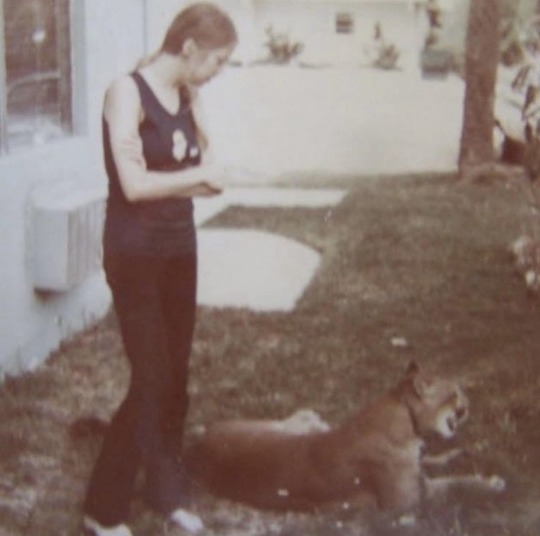

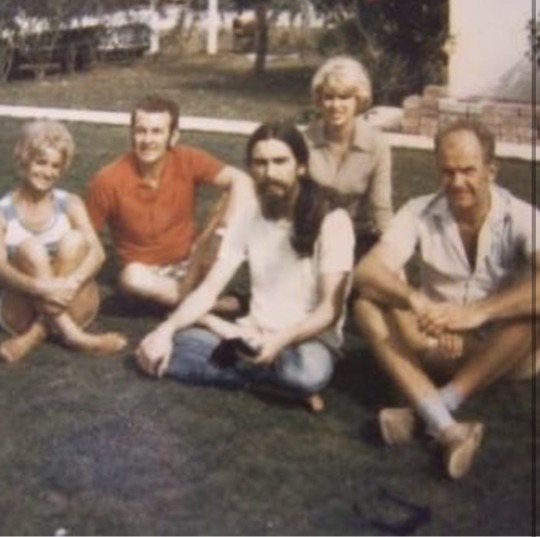
In Florida, November 1970. Photos via Meet The Beatles For Real.
“We were really determined to find him. From various sources, we had learned that George Harrison was somewhere in the Deerfield area. We cordoned off a five-block area and patiently began our search. Claudette Cyr, Beatle fan Club president for Florida, went over to the area to investigate personally while I was on the phone. She got several leads, many bad answers and enough suspicion for us to know the rumor was true.
We drove to the place later at night and went about looking at all the places she had selected as likely spots. No luck in any of them. Disappointed, we decided on one more sweep by the beach. Standing on the beach we saw four long-haired figures and I figured they must have been looking for Harrison too. We asked them and got negative responses and strangely, no interest. Once in the car, I told Claudette I thought one of those people was indeed George. She thought I was crazy.
Back we went and this time we saw them walking through a parking lot. I aimed the car lights on them. George and Patti[e] Harrison and two aides.
I jumped out of the car and told him, ‘George Harrison, nice thing to do. We have been searching for you for almost two days and you are dodge us.’ He smiled and our conversation began.
We asked him about the breakup of the Beatles and about Paul McCartney’s departure. He replied in a non-committal sort of way. He compared the Beatles after so many years to four guys in jail, trapped in an image and trying to break out.
The new album was also a topic. He expects it to be released within the next few days. Included in the album are 25 songs.[…] About the fans (us included) he was grateful but worried the place where he was staying might be discovered. ‘I am not famous anymore. I am not Beatle George anymore. If I wanted to hear screaming I would play Shea Stadium. But I don’t. I am George Harrison, a musician. That’s all.’
George was in Florida to rest and relax. He plans to come back. His wife, Patti[e], was with him. She remained silent all throughout our conversation. She wore no makeup at all. Patti[e] used to be a top model before marrying Harrison, and her face has a way of lighting up when George says something. She smiles a lot.
I have talked to pop people before in my position as entertainment editor for The Phoenix Broward Community College’s newspaper. Harrison’s honesty struck me as being out of this world. Here we were, intruding in his private life, and he took the time to talk to us, sign his autograph, and make some memories we will never forget.” - "BCC Editor 'Traps' A Beatle - George Harrison Stops To Chat," by Ruben Betancourt, Fort Lauderdale News, November 21, 1970
“[George] told [Adria, Tom Petty’s daughter] something that he had never mentioned to me, which is that he had a cousin from Florida who reminded him of me. Before George was really settled at Friar Park, he and this Florida cousin would sleep in every room in this, well, this castle, trying to figure out which one had the best vibe and ought to be the bedroom.” - Tom Petty, Runnin’ Down A Dream (2007) (x)
More about these photos, via the comments section of the Meet The Beatles For Real post:
"A friend of the family pulled up in a station wagon with the mountain lion that day.
I was living at the apt. complex owned by George'd uncle (Gregg Apts.). We all had a fun picnic that day." - anonymous [x]
#George Harrison#Pattie Boyd#quote#quotes about George#quotes by George#George and Pattie#All Things Must Pass#The Beatles#George and fame#fan recollections#fan recollections: 1970s#Tom Petty#et al.#The Traveling Wilburys#George and Tom Petty#fits queue like a glove
114 notes
·
View notes
Video
Clips from 1997 and 2006.
Q: “Why did you get into the music business?”
Peter Tork: “Approval. Respect. Love. Girls.” - Beachwood Confidential, 1995 (x)
* * *
"What I was working towards was to be in a group. When the Beatles hit, where were all the folkies going to go? But I also wanted to be a folk music performer.
A lot of what I did was hanging out, feeling for the first time that I was part of the scene, walking down the street and seeing people I knew, doing a little flirting." - Peter Tork, Bringing It All Back Home: 25 Years of American Music at Folk City (1986) (x)
* * *
"Dear Peter,
I hope this doesn’t sound stupid. It’s something I’ve always wanted to know. Why do rock stars get all the women? I figured you would know. Even my sister likes you a lot and she doesn’t really like anyone very much. She says hi, btw.
I was thinking of becoming an architect but that doesn’t seem to get the girls excited. Should I learn to play guitar?
Thanks bro,
Jon L."
"Dear Jon,
Thanks for asking. I’ve never wondered the same thing; I’ve been too busy trying to get the women by being a pop star so I’ve never had time to stop and tell on the roses, as it were. But since it all came up lo, these many years ago, I’ve actually given the matter some thought. Here’s some of what I’ve come up with:
For one thing, those of us who got into show business did so IN ORDER to get attention. This is sometimes an outgrowth of a conviction in childhood that people didn’t much care about us, or even notice us. We determined that if we could get the millions (or, say, dozens) to love us, then it wouldn’t matter that we weren’t much regarded on an individual basis in our youth. For some of us, it worked. Unfortunately, it has its drawbacks. You don’t get to know these ahead of time, so I’m going to tell you.
One of them is, that the girls we do get mostly want us for the show we put on. By that, I don’t mean only the stuff that goes on onstage, but the way we present ourselves when we meet someone. I have a ready stock of funny stories and sly ways to hook a girl in, but in the end, that’s what she goes for, and when it comes time for me to be myself, she’s always kind of shocked. […] Check it out: architecture is a deeply satisfying career and you’re going to find a relationship that suits you if you’ll only let it happen and what you do for a living will be only one measure of your true value in the eyes of a worthy, intelligent, supportive woman.
Good luck,
Peter” - Ask Peter Tork, The Daily Panic, 2008 (x)
* * *
"In spite of all his clowning, Peter was a rather serious chap. […] Peter was a loud, powerful singer (I used to call him a romp’em, stomp’em type of singer), while I was a soft ballad singer. He had enormous stage presence and I had very little. He played the banjo, I played the guitar. […] He was restless and intense, while I was calm. He loved to be with a lot of people all of the time, whereas I liked to be completely alone some of the time. And last, but not least, Peter Tork had quite a way with the girls." - Bruce Farwell, 16’s The Monkees: Here We Are (1967) (x)
* * *
“Next to his music, girls interested Peter Tork more than anything else in the whole wide world. He loved them all — and most of them loved him. Peter wasn’t tall, dark or handsome, but he made up for his liabilities with his great warmth, enthusiasm and sense of humor. He was also basically a very kind and giving person. He just had a way of making people happy even when he was broke, freezing cold and there were no prospects for work in the future. That Pied Piper-ish quality Peter had attracted girls of all shapes and sizes. He had many brief romances and a couple of very serious ones, and even today Peter is still good friends with almost every girl he knew, dated, or fell in love with during his Greenwich Village days.” - Lance Wakely, 16, March 1967
* * *
“Peter was great for the chicks of the village… they queued up to see him and talk to him. But eventually he had an offer to join the Phoenix Singers, who were short of a guy to play banjo AND guitar. And if you still have any doubts about whether he really does play, and play well, then the thing to do is ask the management behind the Phoenix Singers. Even without the Monkees, there is little doubt that the amiable Peter would have mae the grade in the music business.
When, eventually, Peter went to the West Coast, to California, he wasn’t kept waiting long for fame. Within two months he was auditioned and accepted for the Monkees. Behind him was a mass of previous girlfriends but, unlike many blokes, Peter has the knack of staying on very friendly terms with girls even after he’s stopped going out with them.” - Record Mirror, February 25, 1967
* * *
“...Inside his dressing room, he towels the sweat from [his] head, takes out a guitar, pulls up a chair and starts singing ME a song. [...] He DIPS me, yes, like a dance dip, asks me permission and then kisses ME chastely on my cheek!... [...] Months later, when I returned back to earth, I received a three page letter from Peter Tork (remember, he asked me for my address before the dip) which was just beautiful, poetry mixed with kindness, which is how I choose to this day to describe him as a human.”:
“I heard this on the radio!
‘TODAY at 4pm, THE MONKEES will be appearing at RECORD WORLD!’
I looked at a map to see where Record World was located (yes, I had a map in my glove compartment) and plotted and within seconds, turned the car in the opposite direction of Georgetown and hightailed to some mall in Virginia.
The line to meet the Monkees was surprisingly huge. It wrapped all the way around the mall twice. Anxious to make it back to campus for the first night of my senior year, which we all know is the BEST night of the year, I became anxious the line was too long and The Monkees would leave before they got to me. I needed to come up with a plan, stepping off the line, I found myself moments later in Sharper Image, purchasing a small tape recorder.
With tape recorder in hand, I marched myself up to the security guard outside the RECORD WORLD where all four of the Monkees were signing records.
‘I’m here from the Georgetown University newspaper, The Hoya. I wasn’t even sure if that was the title of our school newspaper…a lucky guess.
‘I’m hoping to get a quick interview with the guys.’
‘Sure, right this way.’
WOW! That was easy.
They let me cut the line and stand RIGHT behind the Monkees while they continued to sign records. Me looking out at a sea of other Monkee lunatics, just like me!
OMG!!! I had NO questions, I had no way of handling being this close to the four guys that I spent my entire pubescent life fantasizing about marrying, dancing or at least camping!
‘Hello.’ Micky Dolenz says to me!!! and I go numb. I got nothing.
I look over to Peter Tork, who asks me my name and when I say Mary, Davy Jones chimes in and says, ‘Ah, Mary Mary.’
WHAT!!!!???? Smelling salts please?? (Actually, true story, Lara did really pass out once when she met Davy Jones at a book signing!)
I stumbled my way through the interview, holding up the tiny tape recorder every time I asked a question. Thankfully they never caught on that the tape recorder didn’t even have batteries in it or that I had not actually pushed any of the buttons to start or stop recording. I just moved it from my mouth to their face, like a child playing make-believe.
I kindly say thank you and tear up. The security guard ushers me away from the table but right before I was about to steal a tuft of [Micky]’s hair, Peter Tork looks at me and said, ‘write your phone number down here.’
In a Monkees haze, I write it and then, I’m quickly whisked away by security.
I cried the entire 3-hour car ride back to DC, happy tears, and this was before cell phones, so I had no one to call and scream the news. Just me, alone, reliving how I had just pulled off a Monkees miracle.
When I arrived back to my senior year house, all my pals were wondering why I was so late and informed me I had thirty minutes to get dressed because we were all heading out for the BIG first night back at school. The night you waited all summer long for, so you could show off how great you looked to your biggest crush.
I threw down my bag, jumped in the shower and was interupted by my roommate telling me that I had a phone call.
Wet from the shower, I grabbed the call.
‘Hi. This is the Monkees Tour Manager. Peter Tork asked me to leave two tickets for you at the Will Call for tonight’s show. It starts at 8pm.’
I looked at the clock…it was 6pm….the concert was two hours away, back to where I had just left the scene of my delicious deception.
I HAD TO GO!
I started down my list of roommates to come with me, one at a time, rejection, followed with ‘YOU’RE NUTS!!’
Finally, I bribed my most beautiful and most fun pal Emily to join me. I think the bribe was, I’ll pay all your bar tabs the entire first semester if you drive to Virginia with me. If you saw how we drank back then, this was a generous offer.
She agreed to join me, but made me promise we could be back by midnight as to not miss out on the first night back to school.
‘Done!’
And there we were, back in my car, heading two hours south, right back to where I just come from.
We arrived at the concert hall and Emily (my personal timekeeper) reminded me. ‘You have two hours…that’s it.’
We had great seats and a bunch of songs in, a roadie came and plucked us from our seats to go backstage. WHAT!
There was an intermission or maybe it was the moment between the last song and the encore, but all I remember what that it was fast and there was a lot of scrambling.
This was the first ‘backstage’ I had ever seen. A minute in, Peter Tork comes over to ME!? Says, ‘I’m so glad you made it’ and invites ME!? into his dressing room.
I look at Emily, who somehow understands just how big a deal this was to me and grants me, sternly, ‘10 minutes!!’
Inside his dressing room, he towels the sweat from [his] head, takes out a guitar, pulls up a chair and starts singing ME a song.
The 13-year old girl in me dreamt about this moment for years and now it was right in front of me. My very own little concert with Peter.
‘2 minutes!’ An announcement comes up on a loud speaker, but the perfect amount of time for him to put down his guitar, change his shirt, tell me that I was a very special person (something about my aura), asks me to write down my address in a small book AND then………
He DIPS me, yes, like a dance dip, asks me permission and then kisses ME chastely on my cheek!
The door opens, Emily is now [tapping] her feet and thwarting off flirtatious talk by Davy Jones (with something I remember as subtle as ‘FUCK OFF!’)
‘You’re done!’ She tells me sternly.
I was, forever. Forever change, just like Marcia Brady was when Davy Jones kissed her on her cheek.
The whole ride home we laughed at the idea that we were ‘groupies’ and I tried to downplay to her how UNBELIEVABLE and SUREAL the whole moment was. Like I had manifested a dream.
Later that night, back with other people my own age, back to what we all deemed very important…shots and dancing, I was still reliving every moment of what happened that magical day, wishing I had a phone to call Lara (she’d never believe it) or that that there was a special Monkees hotline that I could call to discuss ‘my feelings.’
‘What is that!?’ My friend Chudney asked me mid dance to Franki Valli’s Oh What A Night, pointing to a small foam ball peeking perfectly outside the middle of my bra. I looked down, reached in and just started laughing.
Peter’s microphone fob (or whatever the furry thing is at the tip of the microphone) must have fallen into my shirt during our torrid dip.
This was sure to go into the Smithsonian of my life.
Months later, when I returned back to earth, I received a three page letter from Peter Tork (remember, he asked me for my address before the dip) which was just beautiful, poetry mixed with kindness, which is how I choose to this day to describe him as a human.
Yes I was 22 and he was 52, yes this moment would be fully frowned upon today, but it was my moment, willingly and open heartedly. I willed myself backstage and into that dressing room and I’m grateful for that his real sweetness and this (I’m hoping you find benign and funny) story.
Yesterday when I heard of Peter’s passing, I danced with my daughter (even dipped her a few times) and then expressed gratitude to Peter and The Monkees for keeping me innocent, for keeping me weird and for keeping me alive with possibilities of real love – the kind you get from a song, or a glance or a sweet cheek kiss.” - Mary Giuliani, thriveglobal dot com, February 2019
#Peter Tork#Tork quotes#Tork videos#The Monkees#Monkees#1960s#1970s#1980s#1990s#2000s#2010s#early 1960s#'beautiful poetry mixed with kindness'#Monkees fans#long read#Tork fan recollections#1997#2006#Ask Peter Tork#Beachwood Confidential Newsletter#Bringing It All Back Home: 25 Years of American Music at Folk City#can you queue it
31 notes
·
View notes
Text
[FAN STORY] "Those five or six minutes that will stay in my heart forever"
— Excerpt: "ELVIS: Live at the International" by Kieran Davis (2011)


February 18, 1970: Elvis backstage with fan, Judy Cherry. Judy is an England "super fan" of Elvis, who met him in 1970, at the International Hotel in Las Vegas, NV.
Here's Judy's recollections of that moment:
"... The first thing I said when he came out was just a whispered 'Elvis!' He put his arms around me and gave me a nice warm hug. I told him I had waited fourteen years for this and he said 'Have you? That's a long time to wait, isn't it honey?'
Then gave Jamie (the girl with me) a nice hug and said, 'Did you come all the way from England?' She said, 'Yes'
He said, 'Thank you, hon.'
I said, 'Elvis, do you have time for a couple of pictures?'
His answer was a warm, 'Sure.' So while Jamie was getting my camera out, I showed him a copy of the Elvis Presley story, that I had brought with me, and told him I had had it since 1957. He seemed genuinely amazed. He came across this one real old picture and said, 'This really is old, man. I was 21 years old here!'
Note: Possibly, Judy is refereeing to a magazine called "ELVIS PRESLEY: THE INTIMATE STORY MAGAZINE" (Published in 1957)
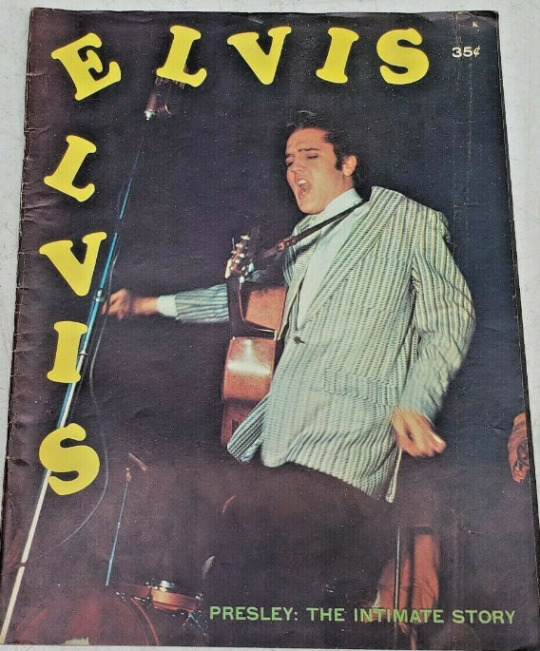

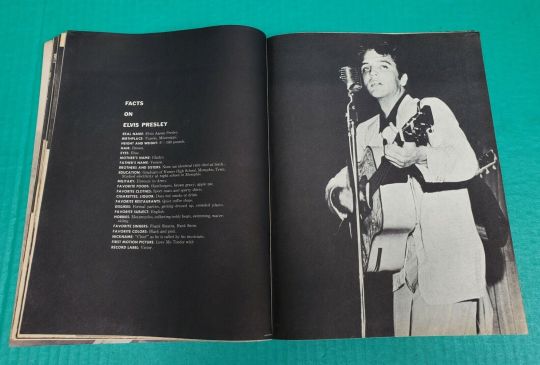
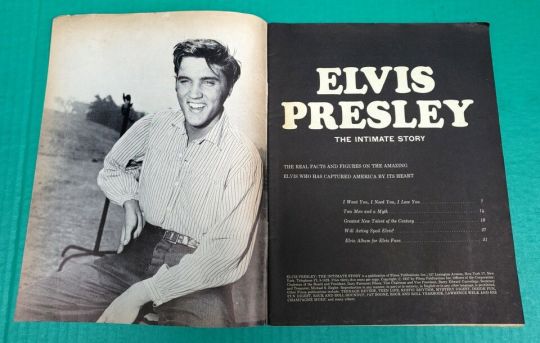

IMPORTANT UPDATE -- March 2024: I won't erase what I published orignally because there are friends who reblogged it already and I feel this can look confusing, but one minor correction is needed. This magazine above is definitely NOT the one Judy Cherry was holding for Elvis to sign. @whositmcwhatsit posted the actual book on her blog which is "The Elvis Presley Story edited by James Gregory, introduction by Dick Clark". I apologize for the wrong assumption I made, friends. I had never saw the actual book cover (until now), thus when researching the name "the Elvis Presley story", as Judy mentioned in her recollection, it only got me to think the magazine I shared on my original post [the one above] could be a the one she was referring to. My bad. Well, it's corrected thanks to our wonderful Jade. ♥ I hope you don't mind, dear, if I use the picture of your copy to illustrate this post.
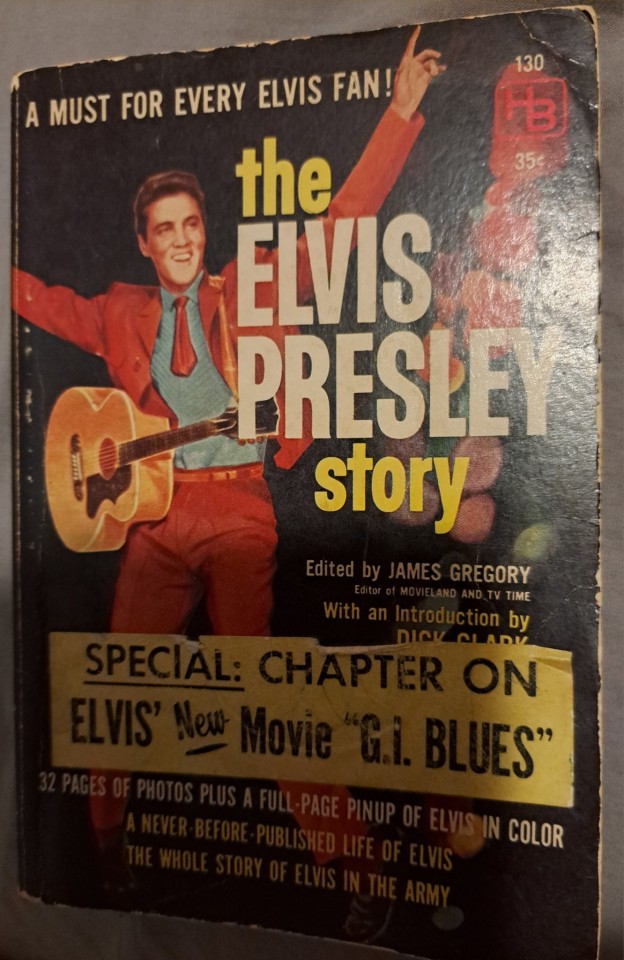
Photo by the copy our friend Jade [@whositmcwhatsit] bought. Lucky girl! Precious!🥹🩷
[Continuing the story...]
"In between these dribbles of conversation we had taken one picture (shown at the beginning of this post), had some trouble with the flashcube and now we're taking another picture... then he turned to Jamie and said, 'Now we are gonna get one with you, aren't we honey?' I got the picture, he said goodbye to Jamie and came over and gave me a hug.
I said, 'Goodbye, Elvis, I'll see you tomorrow night... whether you see me or not: cause I'll be going to the show every night for the rest of the time.' He seemed really surprised at this and said 'Eleven times! Thank you so much, sweetheart. I just wish I could meet everyone of you!'
"He kissed me goodbye and he was gone but the 5 or 6 minutes will stay in my heart forever."
♥
One of the things I love the most about EP (and what turned me into a passionate fan of his) is how loving he was with his fans, he really listened to them. He treated them like people, not numbers or simply "admirers". He cared about giving them the time of their lives once they were there to watch him performing or even if they were just around to ask for his autograph or pictures. Elvis was truly genuine when interacting with them — actually this word "genuine" is used by many of the fortunate fans who got to meet and talk to him, to describe EP's interactions with them.
He cared so much about his fans that it's said he could remember the frequent ones by their names, all of them, the die hard fans, and even asked about some of them to his other fans whenever they were uncommonly not around for a few days (specifically talking about the fans that hanged around at his homes gates now).
EP was a great guy. He deserved all the success he conquered. The best performer ever! It's always said the good ones are always taken from us too soon. Well, that seems to be the truth, tragically. How we wish we could see and talk to him today, having such great memories like Judy's, while EP would be at his 88 year-young of a well-lived life. Imagine the conversations with this guy! The stories he could share with us. Anyway, we'll forever cherish you, EP.⚡♥
#elvis presley#elvis the king#elvis fans#elvis#elvis fandom#elvis history#70s elvis#elvis was so attentive
97 notes
·
View notes
Text
David Lee Roth detailed how he helped conceive the design for Eddie Van Halen’s iconic Frankenstrat guitar.
The frontman recently shared a painting titled “Big Wave,” which fans apparently thought bore a resemblance to Van Halen’s signature red, white and black Fender Stratocaster. On Friday, Roth uploaded a video to YouTube in which he explained that the similarities were not coincidental.
"We've been getting a lot of cards and letters — digitally, so to speak — in regards to [the fact] that there's similarities between my work and the stripes on Eddie's guitar, and that's because it's my work," Roth began. He then reminisced about walking into band practice circa 1975 or 1976 with a roll of gray duct tape, black electrician’s tape and blue art tape, all of which would prove instrumental in the design of the Frankenstrat.
Roth said Van Halen’s guitar was originally white and “eerily reminiscent of Jimi Hendrix.” He suggested the guitarist implement an “expanding linear pattern” to differentiate his axe from that of Hendrix, whose 1970 death was still fresh in people’s minds.
“We laid it down and kaboom. Within like four minutes, I laid it out,” Roth continued. He said the “little squiggle” on the guitar body came from the black electrician’s tape, which quickly pulled as Van Halen worked up a sweat while performing “five 45-minute sets a night.”
youtube
To combat the pulling of the tape, Van Halen instead opted to “spray paint [the guitar] and pull the tape, like pin-striping a low-rider,” creating a “half-tone version” of the body akin to a negative of a photograph. “Essentially — I say with a great big sense of humor — I invented coffee, they invented a cup,” Roth joked.
The singer said Van Halen later added colors to the Frankenstrat and recalled stopping at a “famous truck stop” in San Bernardino, Calif. “I came back with one of those little bubble convex mirrors and a couple little red reflectors and said, ‘Cherry on top,’” he remembered.
Roth said Van Halen’s guitar tech, Rudy Leiren, gave each version of the burgeoning Frankenstrat a name. “The very first name, I don’t recollect. It may well have been Frankenstein,” he said.
The singer also said his former bandmate "developed an industry" with his guitar design. “Eddie was way better at business than I have ever been,” Roth confessed. “They started an industry. It’s not just a franchise. It’s a way of thinking [about] guitar. It’s one of the most recognizable symbols of all time in the sport in this regard here.”
Roth made sure to emphasize that his idea for the Frankenstrat was merely a kernel, which Van Halen brought to fruition. “Somebody somewhere said, ‘Wouldn’t it be easier…’ which is Latin for, ‘Spray paint the motherfucker and pull the tape,’” he joked. “That design wouldn’t have gone anywhere without Eddie sending it and giving it the shape and shine that it did. I’m just proud to have been part of it. The first part.”
#van halen#eddie van halen#david lee roth#ultimate classic rock#news#2021#frankenstrat#youtube#videos#seperated at birth?#rudy leiren
3 notes
·
View notes
Note
RE: LadyLuthians question about non English zines. While I've only been in fandom a bit over 15ish years and so wasn't around for the zine days I am someone for whom English is a fourth language. What I'd advise is potentially looking based on population I.e. the more people there are the more chances of fans getting together and doing the thing essentially. I'd suggest looking at places like India and China (i.e. big populations). Maybe consider finding Indian and or Chinese fans on tumblr or ao3 and reaching out to see if they could connect you to more local resources and websites. And then start networking from there, it might take a while especially since India at least only legalised gay marriage recently and there's alot of stigma to such things. But if your able to make the right friends you should be able to find out more about the local zine culture or what the zine equivalent was. Essentially find where the fans for different countries are locally, hang about and show that your trustworthy and see if you can't find some whose been around a while. theyll usually be willing to share some history. I also have some rough recollections of the fannish experience in the ME back in the day if that might help you too. Anyway apologies for the largely unhelpful advice and best of luck with your research! Maybe consider sharing some updates in the future?
--
Oh, if only it were that simple.
There's a complicated interaction between population size, education, free time, disposable income, and printing technology.
Humans are fans of things, and where there are lots of humans, there will be lots of fans, but it doesn't follow that a fanfic zine culture exists in a given place.
If we're talking about the 1970s, the vast majority of zines, even in California, were "gen" (which means gen or het given the conventions of the day).
16 notes
·
View notes
Text
On Art, on Life, on Death, on Immortality
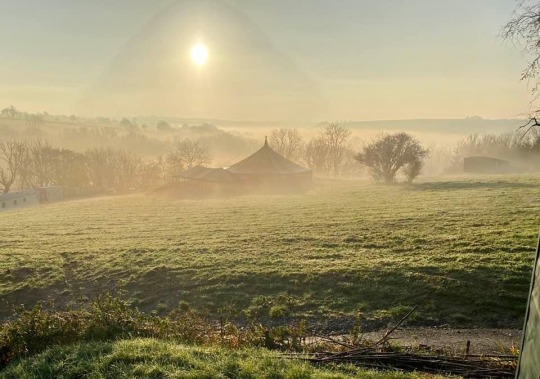
I spent this past weekend on Nik Turner’s farm for his big sendoff into the next realm.
The last time I was there, it was to celebrate Nik’s 80th birthday, but I felt his presence just as much over the last few days. That place, and his family, were clearly his anchor to the physical universe.
(Now, I’m very much a creature of science, but science certainly doesn’t deny the existence of the unknown. On the contrary. The scientific method is an endless process of discovery, transforming the unknown into the better-known. We don’t understand the exact nature of subjective experiences like feeling presences and energies, but that doesn’t make them any less real and powerful experiences to the experiencer.)
One couldn’t possibly imagine a more lovely setting, overlooking a majestic misty valley in the Welsh countryside, surrounded by the raw and somewhat bleak and cruel-edged beauty of nature, gently rolling beneath the expansive winter sky.
This is going to be a bit of a stream of consciousness, I’m afraid, so please just try to flow with it. I’m writing because I needed to express all this in words. It’s the way I process intense emotions, and thus keep my head above the raging torrents. (In fact, I see that my last blog post was also made at a time of loss and grief. I didn’t plan it that way, but, here we are.)
First, we must go back in time a bit to set the stage.
A few years ago, I was at a little festival in Devon where I am a regular performer. At some point, Mark Robson (of Kangaroo Moon) came up to me with the news that Nik was en-route to play a surprise set, and asked if I would like to join in (the band was assembled on the spot). The dancer, Stacia, from the early days of Hawkwind, had come over from Ireland, and was there as well.
Of course I grabbed my synthesizer at once and headed over to the stage!
After the set (which was the first time Stacia had been on stage with Nik in many decades), I remember speaking to Nik, and to Chris May, who had driven Nik there, but I have no recollection of what we talked about. What did stick with me was this sense of having connected with old friends, but ones I hadn’t actually met yet.
Some time shortly after that, Gary Smart got in touch with me, and asked me on Nik’s behalf to join Nik’s band, Space Ritual, for some gigs that were coming up, which I did! Sadly, I only got to play with them twice before Nik had an accident, the upshot of which was a hip replacement operation and a long recovery period that made it necessary to clear his performance schedule for some time. Concurrent with all that was the emergence of the COVID pandemic, which essentially shut down live music for a couple of years anyway.
I’m not really a Hawkwind fan (sorry), though I do genuinely enjoy a few of the tracks they did. I am a Nik Turner fan, though, especially after spending some time with him. He was truly indescribable, so I won’t even try, but anyone who has met him will understand completely.
What I discovered on the long drives with Nik and Gary to and from the gigs we did was that Nik loved Miles Davis. He and I certainly shared common spaces musically, somewhere in the orbits of that vast but singular pivotal point that lies somewhere between Bitches Brew and an acid-fuelled early 1970s psychedelic freak-out.
I never saw him in person again after his operation, but we spoke on the phone several times. There were big plans to do some recording when he was able again, and when the dangers of COVID had dissipated enough.
Sadly, it was not to be.
But, I have so much gratitude for the few moments of his amazing life that I was able to share, and his passing has actually hit me very hard. Much harder than I could have predicted.
And that brings me back to recent events.
I wouldn’t have missed being there this past weekend for anything, but it is December, and would have been an utterly miserable and potentially perilous motorbike journey. Fortunately, a kind and generous soul gave me a lift there in his van.
I re-connected with old friends and newer friends I met through Nik, and made some brand new friends too.
The service was absolutely perfect. Nik’s body was laid lovingly in a wickerwork vessel that resembled a large Moses basket, surrounded by bunches of lavender and flowers, with his saxophone placed at his breast in the manner of an Egyptian Pharaoh, laid to rest with the symbols of his kingship.
I totally lost it with tears of appreciation, grief, joy, admiration, and an indecipherable tumble of disparate emotions when I looked upon his body, and the deluge didn’t really let up all day.
There were beautiful eulogies from his family and close friends. More precious moments than I have time to relate here, but the one that struck me most was when Chris May (a long-time resident on the farm and close friend of Nik’s) was talking about some of the last times they spent together. He was talking about listening to an interpretation of the Hermetica with Nik, and that one of the things that stood out for him was that we humans actually have one up on gods, because we get to experience both mortality and immortality. At that moment, half way through the word “immortality”, the grey clouds parted, and a tsunami of sunlight crested and broke over the gathering, turning the very air to gold.
Then a procession led by Craig McFarlane, piping his fucking lungs out with all his heart and soul in the frosty December air, and a truly beautiful and fitting burial for the earthly remains of a truly beautiful man.
Following that was a remembrance in musical form by members of some of his musical groups, in which I was greatly honoured to take part.
When all that was done, I was thinking of how many musicians and artists had come together there from all corners of the world, and I helped Chris and Glenda and several others to set up an impromptu jam space in the barn. Unfortunately some of the people I had most hoped would be involved had already left, but we still had an intimate little jam that I found very cathartic indeed, and a perfect way to close the day.
The two nights I spent there were the best I have slept in months, and I feel at once rejuvenated and drained, exhausted and refreshed. It’s a bit of a weird state to be in, but I’m sure I’ll recalibrate quickly enough.
As for Nik, he’s not gone.
As long as we all remember him, he lives on in the hearts of everyone his life and art touched, and that’s an unbelievably large chunk of humanity for one man to have influenced. May all of us strive to pass on to others even a fraction of the love and acceptance and creativity which he selflessly and graciously gave to us.
4 notes
·
View notes
Text
Dairy of a Horror Buff 8.20.22
CW: Horrors beyond your mortal ken. nah we're watching some fucked up shit today so maybe sit this one out if you don't want to see that.
UGH BITCHES BUT LIKE IN A GOOD WAY.

I was looking for a gif from there Shiny Happy People Short were there like Happiness more like Hap-penis lmoa gottum but apparently you whores can't appreciate fine art.
I got over that period of self doubt have formulated an action plan and I'll be OK. I just needed some time to emotional process shit which I think is like a good thing. Like is nature healing, like is daddy not repressing his emotions anymore???

I love that tumblr is 50% nihlistic goth mood boards. Keep up the good work ladies, gents, and assorted gentry.
so I was watching Betty Boop cartoons yesterday and I was like hey I haven't seen a lot of animated horror. Surely it exists maybe I should pop some of that shit in my gullet so today lets watch a bunch of fucked up shit online.
but first I kinda have to tell you about what I watched last night.

Stigma (1977) dir. Lawrence Gordon Clark
ok so this and the next one are a diversion from the original format of AGSFC. the last two of the original series are acutally original screenplays. This one was written by Clive Exton. This is also the last film of the series to be directed by Clark.
so the film is pretty basic plot wise. It involves a mother moving to a cottage out on the moors??? the heath??? whatever the fuck its called. one of those british prairie things shes there. and guess what else is there spoopy stones. specifically a stone circle along with what the discription calls a menhir. which is like a stone circle but its just like a single rock.
anyway there like
UWU LETS UNBUWWY THE ANCIENT EWWIL.
the momma gets hella cursed, starts spontanious bleeding, serving us titane realness.
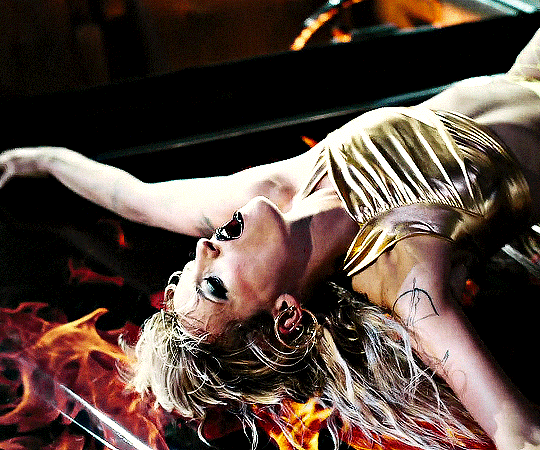
I'm obviously talking about the whole body horror bathroom scenes but this is the only gifs on tumblr for what I feel is obvious reasons.
this film was actually pretty refreshing it gives us this 1970s banality horror vibes which I love. The plot is vague and ambiguious which is what a good ghost story should be. I really liked this.

The Ice House (1978) dir. Derek Lister
Ok so this is the last AGSFC episode of the original series and was also the only one not directed by Clark. Who the fuck is Derek Lister? Apparently he was a theater director who branched into television dramas I imagine hes a famalier name in certain circles but if your not into 80s british theater you like myself have no recollection of him.
Now am I horrible impressed by this film but lets be honest this is television movies meant to appeal to old stodgers. This stuff probably had no budget.
That being said Lister wasn't a poor sport at all, I like the sort of uncanny vibe of this. We have a health spa, creepy incestious siblings, and an ailing protaganist whose convinced theres something spooky in the old ice house.
This honestly gives me poe vibes, (might be the incest), it definetly feels like a classic ghost story in a lot of ways, the way that the horror is slowly metered out, the questioning of sanity, the sort of vague lore thats never spelt out.
Most people find this film to be a poor send off of this series and sure its not creepy and gothic but I honestly did love them trying new things out.
Ok so that was the end of the orginal AGSFC. Might watch the reboot might not now lets watch something fucked up.
youtube
The Scuzzies (2019) dir. Jimmy ScreamerClauz
so what got me on this path was rewatching Nyxfears Disturbing Movies megacut and she mentioned this creator. and I'm like this is the exact shit I'm looking for when it comes to horror shorts.
so one thing that fascinates me is that kind of uncanny 3d animation. I've never been the biggest fan of 3d animation, (through I unirionically like RYBY so take it with a grawn of salt), so that sort of early 2000s look where everything low poly and badly lit is never something I was exposed too.
HIs style feels like a low letter to that sort of thing.
The Scuzzies are what I am assuming are a reace of brownies or similer house sprites who live in some sort of fucked up crack house.
The owner has set up traps and the scuzzies are murdered brutally through a variety of methods that I don't want to describe.
The scuzzies then proceed to go back to their nest, sacrifice an elde3r to create a eldritch hivemind??? who proceeds to seduce the owner of the house and then brutally murder him.
This shit is like an acid trip. everything is disguisting and hard to look at and its feeled with blood and cum and shit, and a bunch of things that are also some combination of that. It's captivating in a really messed up way but I also could never show this to my family.
ok lets move onto something that doesn't involve bloody ejaculate.
youtube
Muse (2022) dir. Lunely
Ok I love how Letterboxd will literally not have some random B-Movie but will absolutely have a random animated youtube short. This is not tea nor shade I just love finding stuff like this on Letterboxd. It gives a kind of validity to a lot of smaller works out there in a weird way.
Anyway there are so many horror animations on youtube that they could never show them all but this one was cute. A young artist wakes up in the middle of the night and walks downstairs to her studio, she sharpens her sketching pencil as her muses silolette is cast by the flash of lightening.
it was cute I like this I need to watch more Calarts Short Films.
youtube
I Live In The Woods (2011) dir. Max Winston
Ok but is this a regular show character or a jojo character asking for a friend. This was horrifric. it starts out so cute until it goes entirely insane and is like how realistic do you want your stop motion gore and viscera.
vimeo
Down To The Bone (2009) dir. Peter Ahern
Ok so this gives me big Don't Starve Energy.
Michael is a boy with really bad allergies. when his shitty babysitter kicks him outside he manages to sneeze so badly that he flips inside out. bloody nonsense ensues.
youtube
Who's Hungry? (2009) dir. David Ochs.
No little german boy don't get icecream.
oh mein gott zis haus es full of kinder-munchen.
so this is another calarts film and also one that I have seen before a couple years ago. Essentially two little kids are stolen by a ice cream man who turns out to be a cannibal. its definetly one that I recommend.
youtube
The Backwater Gospel dir. Bo Mathorne
OK so I'm not sure who Bo Mathorne is but I am obsessed. we're being served dark western which is one of my favorite genres/aestetics. Essentially we watch the townspeple of backwater get ready for church as the local tramp plays his guitar.
The Underaker comes to town, a shade that comes to take one life before he leaves. the local preacher rips the town into a fury to kill the tramp who he sees to be the cause of the harbringer. As you can imagine its a monster are do on mulberry street moment and thre is carnage bloody carnage.
Absolutely iconic we stan.
youtube
Felix the Ghost Breaker (1923) dir. Otto Messmer
so felix the cat actually has a really interesting history. It was made by either Pat Sullivan or Otto Messmer and was acutally rather big in the silent film era. At his point in 1923 it was beggining to lose relevency since fleischer and disney were having there pissing contest at this point and that urinating was captured in stunning surround sound.
Felix was also apparently a comic strip before this and it definetly shows, the animation isn't as fluid as I'm use to with 30s cartoons and the way that the style and the word bubbles are written are vary reminscent of early comic strips. Its almost an animated comic strip in that sense.
I can't say Iove this film but it is a cool part of film history.
Ok one more.
youtube
The Haunted House (1929) dir. Walt Disney
ok so this is pretty much the same vibe as the last couple classic animation shorts. Mickey Mouse goes to a house thats super fucking haunted sweetheart and the ghosts and skeletons and shit are like nobody leaves without singing the blues.
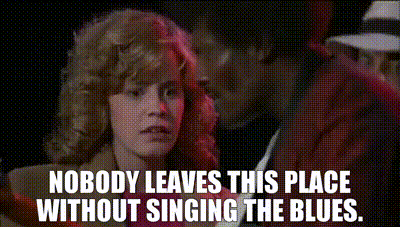
what an iconic movie. directors don't be afraid to put an entire fucking music number in your fucking movie.
so yeah theres some dancing skeletons bois and mickey mouse does a couple sight gags.
OK bitches I'm gonna simp for Elisabeth Shue in Adventures in Babysitting (1987) and watch Salad Fingers while bullet journaling.
4 notes
·
View notes
Text
Practical matters, the Turntable.
I will leave the really crazy money stuff for others.
There is a definite line to cross to get into the good stuff. Once there you probably have 90% to 97% of perfection. Going farther is very expensive and all you will really get is a bit quieter and a bit better speed stability.
A tale of two Tables both on today's local Classifieds. (Vancouver BC Craigslist).

This is a Rega Planar 2 asking 650 bucks. It has an aftermarket Grace 707 arm which is excellent for high compliance moving magnet or moving iron pickups. (Which I think are best) This is a 95% type TT. It leaves you room to get a good pickup and stay under $1000.00. Likely it comes with that pickup in the picture.
My recollection is it is a belt drive unit and easy to keep running for a long long time. It is fully manual, and if you have a steady hand is a great value. I owned two TTs with that arm and it is very good.
There are 4 others in the same price and quality range in the same part of the listings.
This is over the line of good stuff and is not a compromise if used with care.
And here is another example:
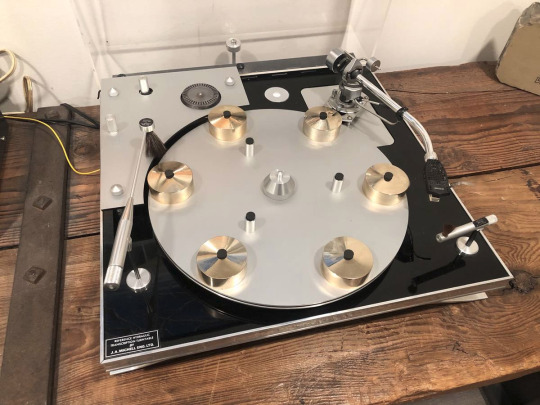
This is a J A Michell Reference hydraulic TT. It dates back to the 1970s and is a work of kinetic art. It was in a Kubric movie and is in one or two museums. It is listed for $4500 bucks and has been listed for over a year I think.
This is not over that line I talked about. It is maybe a 75% table. It has an SME arm which for the vintage is about as good as you can get. BUT. The Platter supports the LP at only 9 places with tiny foam pads. I speak from experience as I owned a TT from the same designer with the same platter and drive. It is FN beautiful but the sound is poor. Since the platter supports the LP on effectively finger tips it does not in any fashion damp vibration in the LP which is surprisingly significant. You will hear a plasticy undertone in many places. You may even have feedback from the speakers.
It is to collect and to look at. Full stop.
Current practice is to have record clamps or weights to hold the LP firmly down to suppress vibration. Some TTs even have vacuum pumps to suck the LP down to the platter. Extreme, but effective.
Going much further than "the line" is rapidly expensive. Other TTs currently listed for about $1600 bucks are only a bit better if at all. There is no limit to how expensive they can get.
As far as speed stability is concerned it can be bothersome. The usual thing is the hole in the center of the LP is just a wee bit off center. That is not the TT's fault. There is a VERY expensive tool that can be used to detect and let that be accurately corrected, but when I mean expensive it is more than the cost of my whole system. Mr Fremer has that of course.
Also fans of different drive types describe all sorts of characteristics that only their favorite drive does properly. Many dislike direct drive. Fun Fact EVERY Neumann lathe used to cut the masters is direct drive attached to the cutting platter with a flex joint. So there!
As far as quiet is concerned that is very subjective. Once the music starts it usually overwhelms the basic mechanical sound of the TT. Most TTs have noise levels far below the noise floor of the recording.
In that vein I notice that at the start and end of most of my records there is a low rumbling or noise that stops just before the music kicks in. I think that is a result of the cutting or pressing process. Usually I hear nothing between tracks on my system.
My preferred linear tracking types are pretty rare. Right now there is one listed in the entire Canadian Audio Mart which is kinda like mine for $500 bucks. There are several of those very compact not quite good types which usually go for $50 to $200 bucks.
I did see one that is totally bonkers made in the Netherlands. It is a Miniot Wheel. Rather expensive.

It is linear and plays the album from below. A triumph of design over practicality. How do you clean the FN album before you play it? Hey dream on people. You gotta try things. At least it takes up very little space on the desk. Some of the details are extremely clever. Hmmmm.
1 note
·
View note
Photo
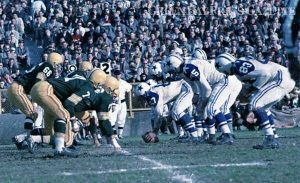
New Post has been published on https://www.packernet.com/blog/2022/09/01/14-has-a-nice-ring-to-it/
14 has a nice ring to it
I’m old enough to remember none of the 1960’s glory years. My first Packer memories are of the 1971-72 seasons. Weird scenes and fuzzy recollections of Bart Starr coming to the sideline holding his throwing arm; a nearly spent Ray Nitschke dragging a bad leg on his way to a pick six. Then there’s that one great division title in ’72, amidst the Dan Devine dumpster fire.
As a Packer fan coming of age in the 1970’s-and-80’s, I learned to expect losing. We learned that lesson over and over. To dream during those two long decades was to dream of .500 team that “might” flirt with playoff contention. Most of the Forrest Gregg and Bart Starr years were pretty dark ones in Packer lore.
Quality and Consistency
Combing my memory for this history is to remind my fellow Packer backers to enjoy the ride. Since 1992, we’ve been pretty spoiled as a fan base. Other than the Patriots, who has had a better 30-year run than Green Bay? Not many, if any.
While coming up short in the playoffs in 2020, ’21 and ’22 were painful pills to swallow, we continue to have a consistent winner to look forward to each week. Although we have “only” two Lombardi trophy’s in the last 30-years, you know fans in Detroit, Minnesota and dozens of other NFL fan bases would gladly trade for our win-loss records.
So what about 2022?
Aug 8, 2019; Green Bay, WI, USA; A Green Bay Packers helmet sits on the sidelines during the game against the Houston Texans at Lambeau Field. Mandatory Credit: Jeff Hanisch-USA TODAY Sports
This year the Packers have a deep talented roster; a presumptive HOF-QB coming off back-to-back MVP’s; a defense that’s loaded (on paper) featuring 7, yes 7, number 1 draft picks that could be among the best in the league; they’re in a weak division in the weaker conference. Leaving training camp the roster looks deep and about as healthy as we could hope.
Let’s not forget that our starting line-up will soon feature 3 All-Pro level players (Bakhtiari, Jenkins and Alexander) that missed most or all of last year.
A trip to the desert in February?
My prediction for 2022 is the Green Bay Packers coast to a Division title and they exorcise the LaFleur/Rodgers recent playoff demons by winning the NFC Title. On February 12th, 2023, the Green Bay Packers will defeat the Buffalo Bills in a nail biter to notch a 14th World Championship. In the unlikely event that these optimistic prognostications go awry, remember to enjoy the ride.
0 notes
Text
Movie Quotes From Hollywood
Movies are frequently remembered even decades later for their quotes and dialogues. A movie fan often will recollect verbatim fees. Those quotes are frequently tossed up by reporters below their quote lists.
“After All, Tomorrow Is Another Day!” – Gone with the Wind, 1939 “I’ll Get You, My Pretty, And Your Little Dog, Too!” – The Wizard Of Oz, 1939
“Love Means Never Having To Say You’re Sorry.” – Love Story, 1970
“I’m As Mad As Hell, And I’m Not Going To Take This Anymore!” – Network, 1976
“I’m Not Bad. I’m Just Drawn That Way.” – Who Framed Roger Rabbit, 1988
“What We’ve Got Here Is Failure To Communicate.” – Cool Hand Luke, 1967
“I Am Big! It’s The Pictures That Got Small.” – Sunset Boulevard, 1950
“Frankly, My Dear, I Don’t Give A Damn.” – Gone With the Wind, 1939
“I Love The Smell Of Napalm In The Morning.” – Apocalypse Now, 1979
“Made It, Ma! Top Of The World!” – White Heat, 1949
“I’m Also Just A Girl, Standing In Front Of A Boy, Asking Him To Love Her.” – Notting Hill, 1999
“The Stuff That Dreams Are Made Of.” – The Maltese Falcon, 1941
“They Call Me Mister Tibbs!” – In The Heat Of The Night, 1967
“You Can’t Handle The Truth!” – A Few Good Men, 1992
“Mama Says, ‘Stupid Is As Stupid Does.’” – Forrest Gump, 1994
“LOuis, I Think This Is The Beginning Of A Beautiful Friendship.” – Casablanca, 1942
“E.T. Phone Home.” – E.T. The Extra-Terrestrial, 1982
”Every Time A Bell Rings, An Angel Gets His Wings.” – It’s A Wonderful Life, 1946
“I’m Having An Old Friend For Dinner” – The Silence of the Lambs, 1991
“Keep Your Friends Close, But Your Enemies Closer.” – The Godfather Part II, 1974
“After All, Tomorrow Is Another Day!” – Gone with the Wind, 1939
0 notes
Photo
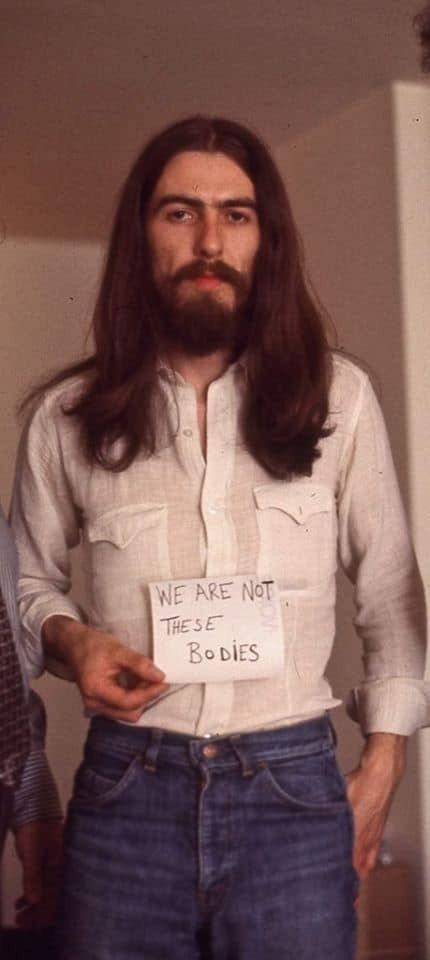
George Harrison in New York City, 1 May 1970; photo by Tim Boxer.
"[Al] Aronowitz remembered the impression George [Harrison] made walking down Fifth Avenue [in the early 1970s], like some holy man with long hair flowing over his shoulders ‘like wisdom from a fountain’. As they were finishing lunch at a sidewalk cafe, a man with a moustache gave George a quizzical look. He walked over and asked, ‘Are you George Harrison?’ 'No,’ George said, deadpan. The man skulked away, convinced he had been misled. George turned to Aronowitz and laughed. 'We’ve got to explain to them that we’re not these bodies.’" - Here Comes The Sun: The Spiritual and Musical Journey of George Harrison (x)
#George Harrison#quote#quotes about George#1970#1970s#fan recollections#fan recollections: 1970s#Harrison spirituality#fits queue like a glove
171 notes
·
View notes
Photo
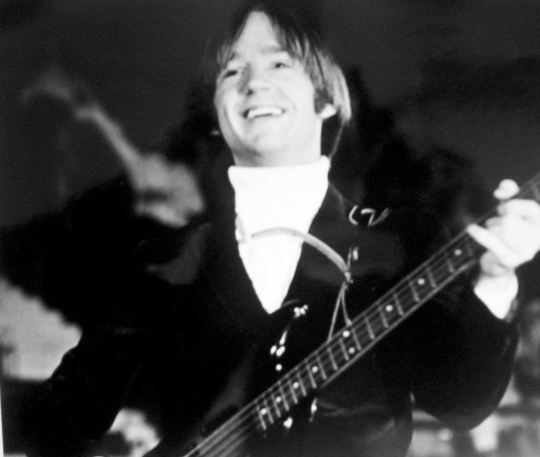
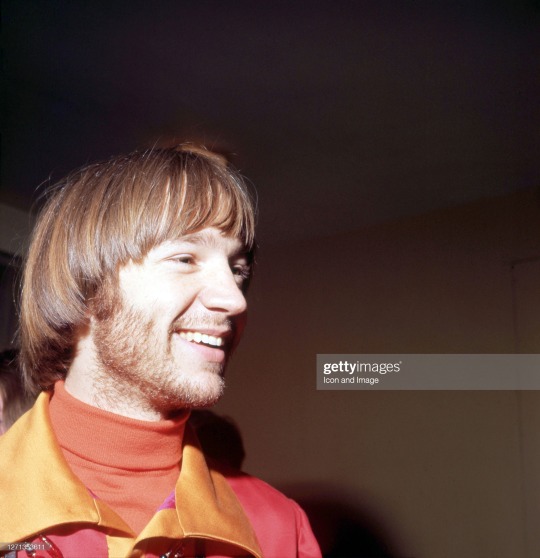
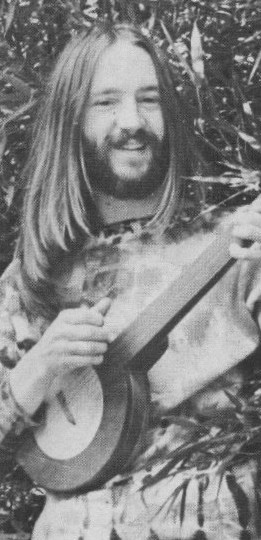
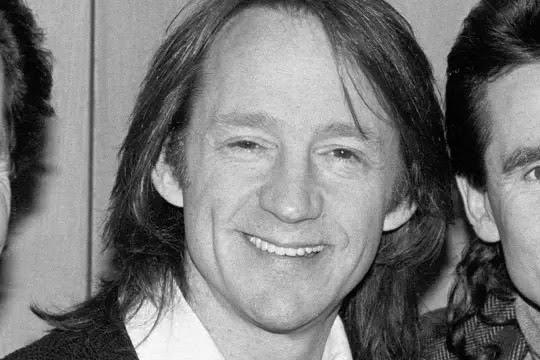
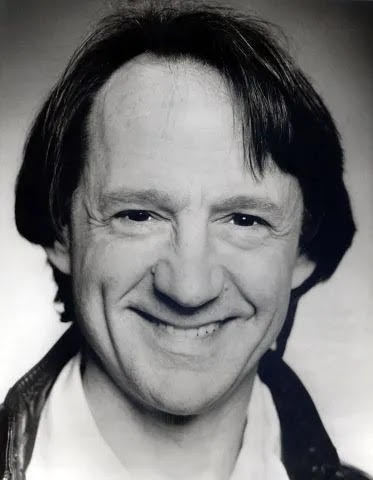

(Photo 2 by Jeff Hochberg/Icon and Image; photo 6 by Bobby Singh/Shutterstock).
"Peter has a beautiful smile." - Jonathan King, NME, May 6, 1967 (x)
"My last sight of him was a smiling figure signing autographs for fans in the rain, each one with a ‘Love from Peter Tork’ and a flower." - June Southworth, Fabulous 208, January 17, 1968 (x)
“Those dimples though. And always such a beautiful smile on that fella. I’ve told the story on the radio about how my friends and I tailed The Monkees tour bus from the Pacific Amphitheater to the 405 freeway through Orange County, post-show, late ‘80s, and that Peter waved to us for miles (with that smile). Oh swoon.” - LA Art News, 2020 (x)
“Tork still has the sweet, dimpled smile, the crinkled, twinkling brown eyes and the long, straight brown mop (although with hairline receding) of his Monkees days. No sooner had he sat at a booth than he was punching up oldies on a jukebox and singing along in high harmony to the Del Vikings and Elvis Presley.” - Los Angeles Times, October 20, 1992
#Peter Tork#1990s#Tork quotes#60s Tork#70s Tork#80s Tork#90s Tork#10s Tork#Monkees fans#The Monkees#Monkees#<3#Tork performances#Tork fan recollections#1967#1968#1970#1989#1995#2016#Fabulous 208#LA Art News#Los Angeles Times#can you queue it
33 notes
·
View notes
Text
youtube
Watch the 2024 American Climate Leadership Awards for High School Students now: https://youtu.be/5C-bb9PoRLc
The recording is now available on ecoAmerica's YouTube channel for viewers to be inspired by student climate leaders! Join Aishah-Nyeta Brown & Jerome Foster II and be inspired by student climate leaders as we recognize the High School Student finalists. Watch now to find out which student received the $25,000 grand prize and top recognition!
#ACLA24#ACLA24HighSchoolStudents#youtube#youtube video#climate leaders#climate solutions#climate action#climate and environment#climate#climate change#climate and health#climate blog#climate justice#climate news#weather and climate#environmental news#environment#environmental awareness#environment and health#environmental#environmental issues#environmental education#environmental justice#environmental protection#environmental health#high school students#high school#youth#youth of america#school
11K notes
·
View notes
Text
Paul McCartney Is Still Trying to Figure Out Love – The New York Times Magazine
By David Marchese, Nov. 29, 2020
Paul McCartney, like the rest of us, this year found himself with an unexpected amount of time stuck indoors. Unlike the rest of us — or most of us, anyway — he used that time to record a new album. The pandemic-induced circumstances of its creation may mark “McCartney III” as an outlier in the former Beatle’s catalog, but as its title suggests, it does have precedents: Like “McCartney” (1970) and “McCartney II” (1980), the album, out Dec. 18, was primarily recorded by McCartney alone, with him playing nearly all the instruments and handling all the production. “At no point,” McCartney said, “did I think: I’m making an album. I’d better be serious. This was more like: You’re locked down. You can do whatever the hell you want.” Which was a gas, as always. “What I’m amazed with,” McCartney explained, “is that I’m not fed up with music. Because, strictly speaking, I should have gotten bored years ago.”
It seems to me that working on music by yourself, as you did on the new album, might allow for some insights about what you do and how you do it. So are there aspects of “McCartney III” that represent creative growth to you?
The idea of growing and adding more arrows to your bow is nice, but I’m not sure if I’m interested in it. The thing is, when I look back to “Yesterday,” which was written when I was 21 or something, there’s me talking like a 90-year-old: “Suddenly I’m not half the man I used to be.” Things like that and “Eleanor Rigby” have a kind of wisdom. You would naturally think, OK, as I get older I’m going to get deeper, but I’m not sure that’s true. I think it’s a fact of life that personalities don’t change much. Throughout your life, there you are.
Is there anything different about the nature of your musical gift today at 78 than in 1980 or 1970 or when you first started writing songs?
It’s the story that you’re telling. That changes. When I first said to John, “I’ve written a few songs,” they were simple. My first song was called “I Lost My Little Girl” — four chords. Then we went into the next phase of songwriting, which was talking to our fans. Those were songs like “Thank You Girl,” “Love Me Do,” “Please Please Me.” Then came a rich vein as we got more mature, with things like “Let It Be,” “The Long and Winding Road.” But basically I think it’s all the same, and you get lucky sometimes. Like, “Let It Be” came from a dream where my mother had said that phrase. “Yesterday” came from a dream of a melody. I’m a great believer in dreams. I’m a great rememberer of dreams.
What’s the last interesting dream you had?
Last night’s was pretty good.
What was it?
It was of a sexual nature, so I’m not sure it’s good for the Kids section. Pretty cool, though. Very interesting, dreams of a sexual nature when you’re married. Because your married head is in the dream saying: “Don’t do this. Don’t go here.” And just to let you know, I didn’t. It was still a good dream.
You know, I was conscious of not mentioning the Beatles early in this interview, and you’ve already mentioned them a few times. So let me ask you: The band broke up 50 years ago. You were in it for roughly 10 years. When you’re not doing interviews or playing concerts, how central to your own story of your life are those 10 years from half a century ago?
Very. It was a great group. That’s commonly acknowledged.
Generally speaking.
[Laughs.] It’s like your high school memories — those are my Beatles memories. This is the danger: At a dinner party, I am liable to tell stories about my life, and people already know them. I can see everyone stifling a yawn. But the Beatles are inescapable. My daughter Mary will send me a photo or a text a few times a week: “There you were on an advert” or “I heard you on the radio.” The thing that amazes me now, because of my venerable age, is that I will be with, like, one of New York’s finest dermatologists, and he will be a rabid Beatles fan. All of that amazes me. We were trying to get known, we were trying to do good work and we did it. So to me, it’s all happy memories.
“McCartney III” will come out very close to the 40th anniversary of John Lennon’s death. Has your processing of what happened to him changed over the years?
It’s difficult for me to think about. I rerun the scenario in my head. Very emotional. So much so that I can’t really think about it. It kind of implodes. What can you think about that besides anger, sorrow? Like any bereavement, the only way out is to remember how good it was with John. Because I can’t get over the senseless act. I can’t think about it. I’m sure it’s some form of denial. But denial is the only way that I can deal with it. Having said that, of course I do think about it, and it’s horrible. You do things to help yourself out of it. I did an interview with Sean, his son. That was nice — to talk about how cool John was and fill in little gaps in his knowledge. So it’s little things that I am able to do, but I know that none of them can get over the hill and make it OK. But you know, after he was killed, he was taken to Frank Campbell’s funeral parlor in New York. I’m often passing that. I never pass it without saying: “All right, John. Hi, John.”
And how about your perspective on the work you did together? Has that changed?
I always thought it was good. I still think it’s good. Sometimes I had to reassure him that it was good. I remember one time he said to me: “What are they going to think of me when I’m dead? Am I going to be remembered?” I felt like the older brother, even though he was older than me. I said: “John, listen to me. You are going to be so remembered. You are so [expletive] great that there’s no way that this disappears.” I guess that was a moment of insecurity on his part. He straightened me up on other occasions. It was a great collaboration. I can’t think of any better collaboration, and there have been millions. I feel very lucky. We happened upon each other in Liverpool through a friend of mine, Ivan Vaughan. Ivan said, “I think you’d like this mate of mine.” Everyone’s lives have magic, but that guy putting me and John together and then George getting on a bus — an awful lot of coincidences had to happen to make the Beatles.
People always ask you about John. I’ve noticed they rarely ask about George, who of course also died relatively young.
John is probably the one in the group you would remember, but the circumstances of his death were particularly harrowing. When you die horrifically, you’re remembered more. But I like your point, which is: What about George? I often think of George because he was my little buddy. I was thinking the other day of my hitchhiking bursts. This was before the Beatles. I suddenly was keen on hitchhiking, so I sold this idea to George and then John.
I know this memory. You and George hitchhiked to Paignton.
Yeah, Exeter and Paignton. We did that, and then I also hitchhiked with John. He and I got as far as Paris. What I was thinking about was — it’s interesting how I was the instigator. Neither of them came to me and said, “Should we go hitchhiking?” It was me, like, “I’ve got this great idea.”
Why is that interesting?
My theory is that attitude followed us into our recording career. Everyone was hanging out in the sticks, and I used to ring them up and say, “Guys, it’s time for an album.” Then we’d all come in, and they’d all be grumbling. “He’s making us work.” We used to laugh about it. So the same way I instigated the hitchhiking holidays, I would put forward ideas like, “It’s time to make an album.” I don’t remember Ringo, George or John ever ringing me up and saying that.
How strange is it to share an idle recollection from your youth, as you just did with that hitchhiking story, and then have the person to whom you’re sharing it — in this case, me — know the memory? It seems as though it would be weird.
It’s quite annoying, David. It’s like people at dinner yawning when I’m telling stories. This keeps happening to me.
I even know the details. You and George slept on the beach.
That’s right.
Some Salvation Army girls kept you warm.
Yes.
Then at some point you sat on a car battery and zapped your ass?
That was George who did that! I have a very clear recollection. He showed me the scar. Let’s set the record straight: It was George’s ass, and it was a burn the exact shape of a zip from his jeans.
Do you remember the last thing George said to you?
We said silly things. We were in New York before he went to Los Angeles to die, and they were silly but important to me. And, I think, important to him. We were sitting there, and I was holding his hand, and it occurred to me — I’ve never told this — I don’t want to hold George’s hand. You don’t hold your mate’s hands. I mean, we didn’t anyway. And I remember he was getting a bit annoyed at having to travel all the time — chasing a cure. He’d gone to Geneva to see what they could do. Then he came to a special clinic in New York to see what they could do. Then the thought was to go to L.A. and see what they could do. He was sort of getting a bit, “Can’t we just stay in one place?” And I said: “Yes, Speke Hall. Let’s go to Speke Hall.” That was one of the last things we said to each other, knowing that he would be the only person in the room who would know what Speke Hall was. You probably know what the hell it is.
Yep.
I can’t amaze you with anything! Anyway, the nice thing for me when I was holding George’s hands, he looked at me, and there was a smile.
How many good Beatles stories are there left to tell that haven’t been told?
There are millions. Sometimes the reason is that they’re too private, and I don’t want to go gossiping. But the main stories do get told and told again.
Can you think of one now that you haven’t told before?
Hmm. I will rake through the embers. Oh, I’ll tell you one! I thought of one this morning. It’s pretty good. I don’t think I’ve told it. You’re going to have to say in the article, “I forced this out of him,” because it’s a bit telling-out-of-school.
I am hereby twisting your arm.
So when we did the album “Abbey Road,” the photographer was set up and taking the pictures that ended up as the album cover. Linda was also there taking incidental pictures. She has some that are of us — I think it was all four of us — sitting on the steps of Abbey Road studios, taking a break from the session, and I’m in quite earnest conversation with John. This morning I thought, I remember why. John’s accountants had rung my accountants and said: “Someone’s got to tell John he’s got to fill in his tax returns. He’s not doing it.” So I was trying to say to him, “Listen, man, you’ve got to do this.” I was trying to give him the sensible advice on not getting busted for not doing your taxes. That’s why I looked so earnest. I don’t think I’ve told that story before.
Tax filings — that’s some deep arcana.
I have dredged the barrel.
I know that your goal with making music is to do something that pleases yourself. What’s most pleasing to you on the new album?
I’m very happy with “Women and Wives.” I’ve been reading a book about Lead Belly. I was looking at his life and thinking about the blues scene of that day. I love that tone of voice and energy and style. So I was sitting at my piano, and I’m thinking about Huddie Ledbetter, and I started noodling around in the key of D minor, and this thing came to me. “Hear me women and wives” — in a vocal tone like what I imagine a blues singer might make. I was taking clues from Lead Belly, from the universe, from blues. And why I’m pleased with it is because the lyrics are pretty good advice. It’s advice I wouldn’t mind getting myself.
There’s a song on “McCartney III,” “Pretty Boys,” that is kind of unusual for you in how the music is sort of unassuming but the lyrics have an almost sinister edge. What inspired that one?
I’ll tell you exactly. I’ve been photographed by many photographers through the years. And when you get down to London, doing sessions with people like David Bailey, they can get pretty energetic in the studio. It’s like “Blow-Up,” [the director Michelangelo Antonioni’s 1966 film thriller about a fashion photographer, thought to be loosely based on David Bailey] you know? “Give it to me! [Expletive] the lens!” And it’s like: “What? No, I’m not going to.” But I understand why they’re doing that. They’re that kind of artist. So you allow it. Certain photographers — they tend to be very good photographers, by the way — can be totally out of line in the studio. So “Pretty Boys” is about male models. And going around New York or London, you see the lines of bicycles for hire. It struck me that they’re like models, there to be used. It’s most unfortunate.
“Lavatory Lil” is another song I was curious about. That’s quite a title.
“Lavatory Lil” is a parody of someone I didn’t like. Someone I was working with who turned out to be a bit of a baddie. I thought things were great; it turned nasty. So I made up the character Lavatory Lil and remembered some of the things that had gone on and put them in the song. I don’t need to be more specific than that. I will never divulge who it was.
I have another bigger-picture question. In your experience, how is the love in a marriage different at different stages of your life and in different marriages?
I don’t think it’s different. It’s always a splendid puzzle. Even though I write love songs, I don’t think I know what’s going on. It would be great if it was smooth and wonderful all the time, but you get pockets of that, and sometimes it’s — you could be annoying. To Nancy I’m pretty complex, with everything I’ve been through.
In what ways?
I’m some poor working-class kid from Liverpool. I’ve done music all my life. I’ve had huge success, and people often try to do what I want, so you get a false feeling of omnipotence. All that together makes a complex person. We’re all complex. Well, maybe I’m more complex than other people because of coming from poverty.
And how do you think about money these days?
It has obviously changed. What has stayed the same is the central core. When I was in Liverpool as a kid, I used to listen to people’s conversations. I remember a couple of women going on about money: “Ah, me and my husband, we’re always arguing about money.” And I remember thinking very consciously, “OK, I’ll solve that; I will try to get money.” That set me off on the “Let’s not have too many problems with money” trail. What happened also was, not having much money, when anything came into the house, it was important. It was important when my weekly comic was delivered. Or my penpal — I had a penpal in Spain, Rodrigo — when his letter came through, that was a big event. When they had giveaways in comics with little trinkets, I kept them all. Some people would say that’s a hoarding instinct, but not having anything when I was a kid has stuck with me as far as money. You know, I’m kind of crazy. My wife is not. She knows you can get rid of things you don’t need.
You’re a hoarder?
I’m a keeper. If I go somewhere and I get whatever I bought in a nice bag, I will want to keep the bag. My rationale is that I might want to put my sandwiches in it tomorrow. Whereas Nancy says, “We’ll get another bag.” In that way, my attitude toward money hasn’t changed that much. It’s the same instinct to preserve. One of the great things now about money is what you can do with it. Family and friends, if they have any medical problem, I can just say, “I’ll help.” The nicest thing about having money is you can help people with it.
Something that has been a constant for you musically is your ability to keep coming up with melodies. It’s there on the new album — the melodies all flow. Is your facility for writing a catchy melody ever an obstacle to getting the songs to be more than just catchy? Because a good tune by itself is not always enough to make a good song. “Bip Bop” would be an example of that. Do you know what I’m saying?
No, I know. “Bip Bop” is not lyrically stunning. I was always embarrassed about that song. Literally, it goes, “Bip Bop / take your bottom dollar.” It’s inconsequential. But I mentioned that to a friend, a producer, a few years ago, and he said, “That’s my favorite song of yours.” So you don’t know what people like. It’s enough if I like it and enjoyed putting it on record and don’t particularly want to think of any more lyrics. I don’t want to sweat it. Sometimes maybe it would be better if I sweated it. Once or twice I tried to sweat it, and I hated it. It’s like, What are you doing this for?
Sixty-something years into writing songs, do you feel any closer to knowing where melodies come from?
No. There is something with my ability to write music that I don’t think I’m necessarily responsible for. It just seems to come easier to me — touch wood — than it does to some people. That’s it. I’m a fortunate man.
#paul mccartney#old paul#grandpaul#*m#(the start of the interview was pretty worrying (with him bringing up yesterday like after 5 seconds) but actually?#it turned out to be a decent one)#favourite bit hands down paul's dirty dreams. DUDE... he cannot keep it in his pants even when he is in his dreams#well actually he said he did but lmao#but yeah many other great bits. ''i'm a keeper'' ... loved that one#the complex man rant#and the john and george bits#him being the instigator#!!!!!!!!!!!!!!!!!!!!!!!!!!!!!!!!!!!!! i love this guy :)
167 notes
·
View notes
Note
Hello! I’m wondering what your take is on Dear Friend (and especially “I’m in love with a friend of mine”?) I find the song a little confusing, and I’ve read a lot of different interpretations. I really love your films and I know you’ve done a lot of research, would love to know what you think. Thanks!
Thanks for your appreciation, anon! I love Dear Friend and am happy to share my thoughts on this haunting, mournful, mysterious song!
I’ll be the first to admit the lyrics are confusing (like so many McCartney songs!), mostly by virtue of the fact that Paul uses “friend” twice in a row. Are there two friends, or only one? By using the word “friend” on top of each other as he does, it suggests either a single friend (the titular “Dear Friend”) in two situations OR two friends, in separate/competing situations.
Dear Friend, throw the wine
I’m in love with a friend of mine
Really, truly, young and newlywed
Of course, everyone is entitled to their own opinion, interpretation, fantasy, etc. and no one but McCartney himself can definitively declare precisely what he meant with this song. But it’s my opinion that Paul was saying the latter; that he is in love with his friend and new wife, Linda. This is my conclusion after having deeply researched this period extensively for TWO documentary series (McCartney (2020) and Understanding Lennon/McCartney), an opinion that obviously no one is required to entertain and anyone is free to discard. But for those who are interested, I’ll share my reasoning below.
Firstly, this is NOT an attempt to disprove that Paul was ever in love with John or vice verse. They both used this term publicly and therefore probably/possibly did privately with each other as well. But Paul’s statements in April, 1970 pretty clearly spell out the situation:
“Personally, I don’t think John could do the Beatles thing now. I don’t think it would be good for him.
John’s in love with Yoko, and he’s no longer in love with the other three of us. And let’s face it, we were in love with the Beatles as much as anyone.”
So John and Paul were “in love” (with each other as people, or the Beatles as a concept, or Lennon/McCartney as a team, etc) for a long time. But by 1970, they both have new spouses and new lives and are following different paths. Here’s a brief recap of the events that led to this statement:
In a now-famous meeting in September 1969, John told Paul that he was leaving the Beatles and wanted a divorce. Whether this was an idle threat designed to scare/hurt Paul, or a real desire on John’s part is open to interpretation, but Paul, for his part, took it seriously.
Allen Klein asked John not to go public with his decision to leave the group and John happily and uncharacteristically agreed to sit on this “news” indefinitely. Paul subsequently disappeared for 6-8 weeks, mourned the loss of the band privately in Scotland, and then began working on his first solo album. Communication between John and Paul fell apart at that point, and John began a campaign of maneuvers - possibly engineered or facilitated by Klein - to bring Paul back into the Beatles’ fold and force him to submit to Klein’s management and John’s leadership. Backed into a proverbial corner by John, George, Ringo, Yoko and Klein, Paul played the last card he had: he quit.
In April 1970, Paul made the split official (deliberately or accidentally? YMMV) with the release of his first solo LP, and attempted to finalize the divorce with an uncooperative John for the remainder of the year. As is pretty well-documented, Paul tried for a quick and amicable split, requesting a release from the Beatles’ contract. But after John was unresponsive and Allen Klein advised him to set duplicitous legal traps that would prevent Paul from separating from the Beatles, Paul (as advised by his lawyers) decided to sue for divorce by the end of 1970.
By 2020, even the most casual Beatles fans know two basic truisms: 1) that Paul loved John always and 2) that Paul didn’t want the band to break up. Of course there’s more to the story than just that. We have also been told repeatedly that John “left Paul,” but this is not the whole truth either.
Essentially what John did was yell “I’m breaking up with you!” and then block the door every time Paul tried to leave.
As late as September, 1971 John is still saying publicly that he hopes Paul will return.
Int.: Let's talk a bit about Paul's aversion to Klein. From what we've read it seemed as if this wasn't there in the beginning, even though Paul wanted the Eastmans to run things. But it came on later as things progressed. And yet despite this, we gather that Klein was still hoping that Paul would return to the group.
John: Oh, he'd love it if Paul would come back. I think he was hoping he would for years and years. He thought that if he did something, to show Paul that he could do it, Paul would come around. But no chance. I mean, I want him to come out of it, too, you know. He will one day. I give him five years, I've said that. In five years he'll wake up.
[Narrator voice: Paul did not came back.]
Yes, Paul loved John. No, Paul didn’t want the Beatles to break up.
But when John said he wanted out, Paul took him seriously, respected his decision, never made a single attempt to woo John back and showed up 6 months later with a moving van and divorce papers.
When you hear Dear Friend out of context -knowing only that Paul loved John and was sad after the breakup- it’s not wholly unreasonable to think maybe Paul was declaring his eternal love for John here:
I’m in love with a friend of mine really, truly, young and newlywed
But when you experience Dear Friend in the proper context, that interpretation sounds less and less likely. Here’s Paul:
April 21, 1970
“I’m not blaming her. I’m blaming me. You can’t blame John for falling in love with Yoko any more than you can blame me for falling in love with Linda.
We tried writing together a few more times, but I think we both decided it would be easier to work separately. I told John on the phone the other day that at the beginning of last year I was annoyed with him. I was jealous because of Yoko, and afraid about the break-up of a great musical partnership. It’s taken me a year to realise that they were in love. Just like Linda and me."
Summer 1970
Paul writes John a 12-page letter requesting that they “let each other out of the trap.” John’s response was a picture of himself and Yoko with a balloon drawn above his head saying “How and Why?”
Paul responded: “How? By singing a paper that says we hereby dissolve our partnership. Why? Because there is no partnership.”
April 16, 1971
PAUL: “We used to get asked at press conferences, 'What are you going to do when the bubble bursts?' When I talked to John just the other day, he said something about, 'Well, the bubble's going to burst.' And I said, 'It has burst. That's the point. That's why I've had to do this, why l had to apply to the court. You don't think I really enjoy doing that kind of stuff. I had to do it because the bubble has burst-- everywhere but on paper.' That's the only place we're tied now.”
Nov 11, 1971
MM: But John said to me that what you’d done in bringing the [court] trials up and everything was what they all wanted, that you’d just done it a lot earlier than they would have done.
PAUL: Well if that’s true, well… well, come on! That’s – see, I’ve told you… The joke is, though, that we don’t have to do trials. It’s not necessary. If the four Beatles signed a bit of paper, or even ripped the old contract up and said, “This contract is no longer valid, we all hereby said it, we all legally direct the shareholders…” the whole thing, to wind it all up, we could do it. And if that’s really what he wants, he could do it this minute. [snaps fingers]
Furthermore, Paul was deeply in love with Linda during this period, as reflected by: the songs on both McCartney and RAM, the testimony of those around them at the time and by Paul’s own recollections. The first few years of Paul and Linda’s marriage was their honeymoon period, their era as newlyweds. It was certainly an awful time for Paul in many respects: the business battles of the Beatles were excruciating and extremely stressful and the loss of his three best friends was heartbreaking. Furthermore, the rock press had largely turned against him (sometimes viciously so), and John & Yoko (and Allen Klein) were painting him as a traitor to the counterculture and a villain for destroying the Beatles with his granny music, giant ego and overbearing personality. Paul and Linda were extremely isolated, partially by choice and partially by force.
But even though this was a terrible time for Paul in many respects, he was extremely happy with his new family. He later described this period with Linda as one of the happiest periods of their life. Paul has said numerous times Linda (along with nature and horse-riding) brought him out of depression after the Beatles ended and gave him the strength to push forward with his solo career, at a time when many were rooting against him (and a literal cult was forming that claimed he was DEAD and had been replaced by an inferior imposter- let that sink in for a moment!). He has been consistent about it over the years, and reiterated it as recently as 2020:
UNCUT: Tell me about the guy in the photo n the McCartney sleeve. He looks happy.
PAUL: I was really happy, yeah. The Beatles had become such a business machine, and with the arrival of Allen Klein the whole thing, every day was very unpleasant.
UNCUT: So there you were on the farm, finding solace in a new family...
PAUL: Yes. I had a little place in Scotland. So we just went out there. “It’s so remote, no one can be bothered trekking all the way up here for a meeting.” It was a good period. We grabbed our freedom- you know what, we seized the day! Also, I had a new baby; I’d not been a father before, so I was very happy.
In December of 1970, John gave his infamous Lennon Remembers interview to Rolling Stone. According to the liner notes of the Wildlife reissue from 2018 (and confirmed by the timing of the demo), Paul composed Dear Friend in reaction to John’s comments in that interview (not How Do You Sleep, as is commonly believed). But he sat on the song for awhile and didn’t record it until late 1971 (for inclusion on Wildlife). Judging from the tone of Too Many People and other songs on RAM, Paul’s initial sadness, confusion and disappointment gradually morphed into (or perhaps swung back and forth between) anger and defiance, accompanied by a taunting and/or gloating tone. Having gotten Dear Friend out of his system, it seems it simply didn’t fit thematically on RAM. Perhaps after the release of HDYS, Paul was deflated and despondent enough to return to Dear Friend? Perhaps Jealous Guy tempered or calmed Paul’s anger?
Or maybe it was just a genuine attempt to turn the heat down. We know that immediately following its release, John and Paul agreed (seemingly at Paul’s insistence) to quit bickering in public.
In any case, Dear Friend is a complex songs with a spectrum of emotions. Unlike Jealous Guy it is not apologetic; it’s mournful but also incredulous and slightly accusatory. Paul appears to be calling John’s bluff: Do you really believe all the bullshit you’re spewing?
Are you a fool, or is it true?
The John Lennon of Lennon Remembers is without hope or faith, denouncing everything he ever believed in and everyone he ever trusted -with the notable exceptions of Allen Klein, Phil Spector and Yoko. Paul clearly loves John and hopes to salvage their relationship, but Dear Friend was written at a time when John was being manipulated and exploited by people he later admitted were misplaced “daddy figures.” While Klein and Spector turned out to not be the most reliable friends to John, Paul certainly seems to know and understand John’s vulnerabilities and motivations better than most. As he sings in the demo:
Are you afraid? Or are you blue?
So why does Paul mention that he’s newlywed and in love with Linda? Firstly, because he is, and he wants to celebrate with his best friend. We know Paul’s desire was for the two couples to make peace and be friends. Pour the Wine. Clink glasses and celebrate their new marriages together.
PAUL: Dear Friend was to do with John, a bit of longing about John. Let’s have a glass of wine and forget about it. A making up song. (July 2001).
This is precisely what the two couples did in December of 1971, immediately following the release of Wildlife.
JOHN: We were both nervous, the four of us were nervous. I hadn’t seen him for a long time. I’d spoken on the phone [with him]. Uh, it was alright, you know. It was alright.
This is precisely what happened again throughout 1974 (with John & May Pang this time around), which John affectionately called their “Beaujolais evenings.”
Admittedly, It may seem odd for Paul to mention that he is happily married (and in love with another “friend”) in a make up song to John. Until you think about the romantic tension between John and Paul and Paul’s bold public recognition of it with this statement: “It’s taken me a year to realise that they were in love. Just like Linda and me.” Paul acknowledges here that John is in love with Yoko and wants John to acknowledge his love for Linda as well.
In Dear Friend he’s communicating that there is nothing to fear; they are secure in their respective marriages, there is no need to be hurt or angry or jealous anymore. We’re no longer partners, but we can still be friends. “Let’s have a glass of wine and forget about it.” A softer, gentler version of: Wake up, John. It’s over. Sign the fucking papers already.
So I think of Dear Friend as an olive branch, but not the groveling type some apparently do. And I most definitely do not think it was a signal to John that Paul was still in love with him, despite being newlywed to Linda.
I suppose it might seem a bit brutal for Paul to be singing about loving someone else in a song to John (although he’s done it before and I think John has done the same). But I honestly think it is something Paul believes John needs to hear and accept at this point; that he is “really, truly” in love with Linda and that he’s not about to divorce her or run after the first “blonde with big tits” as Allen Klein so charmingly suggested.
By September 1971, John still hasn’t seemed to accept Linda, or Paul’s relationship with her:
John: Paul always wanted the home life, you see. [... long, rambling story about being terrified when Paul got a job in 1961 and for a second looked as if he might abandon John and the group]
All the other girls were just groupies mainly. And with Linda not only did he have a ready-made family, but she knows what he wants, obviously, and has given it to him. The complete family life. He's in Scotland. He told me he doesn't like English cities anymore. So that's how it is.
Int.: So you think with Linda he's found what he wanted?
John: I guess so. I guess so. I just don't understand . . . I never knew what he wanted in a woman because I never knew what I wanted.
With comments like this John seems (IMO) to be twisting himself into knots trying to rationalize Paul’s choice of Linda, practically wondering aloud what could she give him that I couldn’t? He still seems unwilling to face or accept what Paul begrudgingly accepted and admitted years before: that his partner fell in love with someone else.
Here’s 76 year old Paul reminiscing about this tender, bittersweet time in his life, happy and in love with his wife and young family and simultaneously in deep pain over losing his dearly beloved best friend:
I remember when I heard the song recently, listening to the roughs in the car. And I thought, ‘Oh God’. That lyric: ‘Really truly, young and newly wed’. Listening to that was like, ‘Oh my God, it’s true!’ I’m trying to say to John, ‘Look, you know, it’s all cool. Have a glass of wine. Let’s be cool.’
“Let’s be cool.” Not “Please take me back,” not “Ignore my just-for-show marriage, I’m still in love with YOU.” To me, Paul is saying “I’m really, truly in love with my friend and new wife, can we please just be happy for each other? It’s all cool.” And for the record, I don’t find this sentiment any less loving on Paul’s part because I don’t think Paul being in love with his own wife (which he was), detracts from his love for John in any way. Again, I agree that the lyrics are slightly ambiguous, and perhaps this is meaningful too. It could be that the lack of hard boundary between the two friends (John and Linda) reflects how much Paul loves them both; they certainly aren’t positioned as opposites (i.e. I love her but I hate you). Instead they’re both part of the imagined celebration; Paul wants them all to share the wine together- and he wants them to tolerate (love) each other.
I think the traditional narrative doesn’t account for all of this because the traditional narrative does not acknowledge that John has any feelings for Paul in the first place. How in the world could Paul be asking John to “be cool” and accept the new situation when John didn’t even care about Paul in the first place and had been trying to get rid of him for years? This perception - of John gleefully blasting Paul with HDYS and Paul replying that he’s in love with John - has taken hold in many minds and has picked up a lot of steam in recent years with so-called “jean jackets” because they fundamentally believe that Paul’s love for John was one-sided. They cannot comprehend that Paul would ever tell John to “cool it” or back off in any way (even in 70-71) because they take the surface story at face value: John dumped Paul for Yoko and heartbroken Paul spent the rest of his life desperately trying to win John back. This is the narrative depicted in virtually every book I’ve read. My analysis is based on my own research, not this narrative.
I would invite readers of this post to watch (or re-watch) ULM (particularly volume 3 ) for a more comprehensive study of John and Paul’s relationship.
Lastly, after doing my own independent research for McCartney (2020), I found that the Paul McCartney described by the musicians and collaborators in Paul’s life was dramatically different from the person depicted in books like Man on the Run. My films are free from narration and commentary; I rely on first-hand interviews and information from the people involved, and in my opinion there is a great deal to be learned about Paul from the way he relates to others, especially through music. And although the McCartney series is about his solo career as opposed to his Beatle career, I would definitely recommend it to anyone who is interested in Lennon/McCartney for the insights they could gain.
Thank you very much for this ask- hopefully there aren’t too many typos!
176 notes
·
View notes
Text
About the Interview
Since I posted the interview with J - a woman who has described herself to me as one of Queen’s first “groupies” - there has naturally been a lot of discussion about the veracity of the interview, the source, and my own motivations in posting it. I fully expected that, and I will say once more that nobody (apart from a small handful of anonymous trolls) has behaved inappropriately in these discussions. I have not received any “hate” because of this. There is no “drama”. Nobody is wrong, or a party-pooper, or attacking me by expressing their doubts. I have seen some awful bile spat at people anonymously recently, and that kind of behaviour has got to stop.
Now, if you don't think I am genuine, there is obviously nothing I can do about that.
However, what I am hoping to do here is add as much transparency as I can in regard to how and why the interview happened, and also share my own full thoughts on it with you.
First things first. No unverified, anonymous source can be seen as definitive proof of anything, ever. That is my stance. I have myself been criticised for so much as suggesting that other anonymous sources tied in with Freddie’s history are not 100% proof of one thing or another. But for me, an anonymous source can never mean more than at best: this seems very likely, but we can’t be 100% certain.
Perhaps I was naive to think that what I considered to be enough of a disclaimer at the beginning of the interview, was enough. My intention was to express that while I, personally, believe J to be a) the person she says she is and b) genuine about what she remembers, that does not mean I believe everything she has told me is fact or happened in that exact way. I thought this was obvious. Perhaps I was unclear, and I apologise for that.
So let me be clear. There is nobody in the world who has perfect, factual recollections of what happened to them almost 50 years ago. Not even J herself claims for one moment that this is the case. She mentions several times that these are old memories from when she was very young, that she indulged in recreational drugs at the time, and that her views - of course - carry a personal bias. All this, I thought, would be enough for readers to know not to take everything they read at face value.
All of the above is why I kept my own thoughts and notes to a minimum within the interview, why I didn’t correct or point out obvious mistakes. I simply assumed that everybody would go away and read the interview against all the sources and information they already have, as I have done myself.
But maybe that was somewhat irresponsible of me, and I should have been the first person to dig into how J’s memories fit in (or don’t) with the information which is already out there, and how to put the two together. While I refrained from sharing all my thoughts alongside the interview (although I have fragmentally done so in response to other people since), others like @quirkysubject (here), @iwilltrytobereasonable (here), @emmaandorlando (here), @sarinataylor and @talkingismylifewrites (here) all had some very good things to say. All of them make excellent points. DO NOT UNDER ANY CIRCUMSTANCES SEND THEM NASTY MESSAGES. I frankly can’t believe I have to say this at all.
I found myself in a difficult position, because as the person who had spoken to J and asked her all these questions, I did not feel as though I could dissect her words as freely as anybody else. She has put a lot of trust in me, and I do not want her to think that I question her honesty and intentions. Because I don’t. If I hadn’t felt as sure as I reasonably can be that she is the person she says she is, and that her story is genuine from her perspective, if I had been in any doubt about that, I would not have made it public.
Here's the thing:
Even if you don't believe J knew the boys, her recollections of the time period alone are still valuable and incredibly interesting, giving us a glimpse of early 1970s London.
But I do believe J. Why?
Before I answer that, let me just say: I fully realise that of course the fact that it was my story J happened across, and me she decided to speak to because of it, makes me more inclined to want to believe her. However, other authors I'm friends with, as well as myself, have received messages from older people several times before. It does trigger nostalgia when a story is very strongly rooted in a time somebody has lived through. There are older people in the fandom. (I recently ran a poll and all age groups were represented even here on Tumblr.)
Now, on to the reasons why my communication with J has felt nothing but authentic to me.
1. She was never in any rush to get in touch with me or relate information to me. It took her a few days to email me after she first spoke to me in the comment section, where I begged her to please get in touch. She then sent me the same email five times, over two days, because she couldn’t quite work my email address out at first.
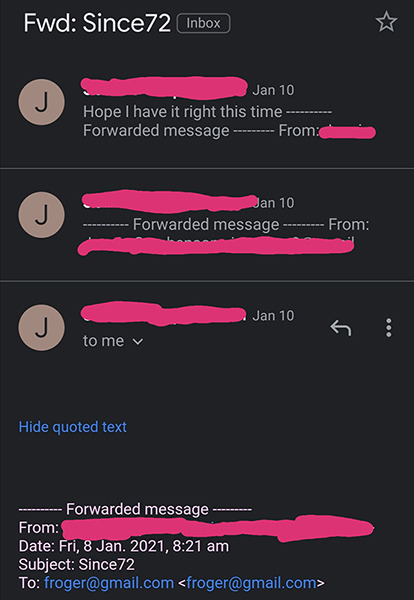
I ended up asking several questions more than once to get an answer because they were overlooked. The conversation went off on tangents, and we chatted about her weekend at her friend’s house (and I was presented with a beautiful snapshot of the beach), the memory box her daughter made for her, her work and other things. There were stretches of days at a time when J simply didn’t find the time to get back to me. And I may have badgered her with a few too many emails asking her to please remember to answer my questions when she has a moment. In short, it was the opposite of somebody rushing to share their story. I was doing all the rushing. (I realise that I am asking you to take my word for this, but this did not all happen in a vacuum. @plainxte, @quirkysubject, @fingersfallingupwards, @onegoldenglance and @freddieofhearts witnessed the process first-hand, as well as my excitement and some of J’s original emails.)
2. J was very trusting. I know her full name, where she lives and her place of work. She sent me current pictures of herself and her husband unprompted. At no point did she ask me not to reveal her identity, that is a call I made because I did not want to expose her to any possible harassment.
3. There were a few things in her account of what she remembered which were so obviously at odds with what we know to be true - it’s well-known John is a bit taller than Roger, for example, but J remembered him shorter, Queen went to Sydney in ‘85, J remember it as ‘84 - that I couldn’t help but think, if I was somebody who was trying to convince others of a made up story, the first thing I would surely do is make absolutely certain to get the facts which are easily findable right. Instead, J always lead with: this was all a long time ago, I’m sorry, I’m doing my best trying to remember.
I realise that a very clever hoaxer could do all this and convince me. But here the question has to be, to what end? This would be quite an act for someone to arrange, to make it seem quite so naturalistic. Nobody would go through the trouble of doing that for nothing. There’s no monetary gain. Scandal? There is nothing scandalous in the interview. Attention? J is barely an active member of the fandom. She has managed to create a Tumblr though: @since72. There is one post currently.
It also took her a couple of days to get back to me after I posted the interview.
In brief, I have no logical explanation for why somebody would go to these lengths and fool me so cleverly, with such attention to detail, when there seems to be nothing in it for them. Why then did J bother to talk to me at all? What was her motivation? Well, after I thanked her profusely for doing this, she simply said that she felt she owed me as reading my story had brought back so many memories for her.
All of the above is why I strongly feel that J is very much real and genuine. But I completely understand that it all hinges on the fact that in order to believe everything I say is true, you would have to trust me. And I know that as I am just another person on the internet, you have no reason to do that. But I’ll get to me in a moment.
Here are a few more doubts which I have seen come up with regard to J.
Why would she be reading fanfiction about people she knew? That’s weird.
To be perfectly honest, exactly that was my first reaction, too. But then I thought about it and talked to friends about it.
Firstly, J says herself that she was never a close friend. I agree that it would be far weirder to read fanfiction about somebody you knew very well. Having said that, John Deacon’s son has been known to read Queen fanfic about his father (and read it out on his YouTube channel). But I think given that it’s been half a century and J has been watching Queen in the public eye ever since, it isn’t really all that strange to read about fictional versions of them.
Secondly, a friend of mine noticed that it seems as though older people in the fandom find J overall more credible than younger people. I’m 35, and it is true that the older we get, the more we look for the things which remind us of our younger years. There is an urge to remember and re-live. You can trust me on this, or you can ask anyone over the age of 30 or 40. Nostalgia is real, and it only comes to you with age. Why would somebody who had briefly brushed shoulders with people who later became celebrities not take an interest in them later? It seems natural that she would. As J says, she never stopped being a fan of Queen’s music and came across fanfic when she looked up Adam Lambert. Is it really so strange that she would find fanfic about them entertaining? Having given it all this thought, I really don’t think so.
It’s unrealistic that she was so young.
This is something I have to disagree with. Times were different. Pete Townshend entered Ealing Art School at age 16, according to Wikipedia. My mother (currently 62) moved 600km away from home at the age of 15 to study piano at music college. I myself moved out from home at 17 (no tragic reasons whatsoever), but that’s beside the point. I have seen it framed in a way where it was said that “It isn’t realistic that a 16-year-old was hanging out with Queen who were all in their 20s”. I agree, it would be a little strange if the story was that one 16-year-old girl was hanging out with Queen by herself as their good buddy. But that is not the story. (Even though it is well-known that during the 60s and 70s, young teenaged groupies did in fact hang out with rock groups very frequently. Of course, J was not that kind of groupie.) She was simply part of a large circle of friends, by her own admission not a close friend of the band. Personally, I struggle to see how this is unrealistic in any way.
It seems super suspicious that she lost her photos in a flood.
Yes, it does. I agree. J realises that, too.

Like @quirkysubject said in her post, I don’t blame anyone who is too sceptical at this point. But there actually was a pretty bad flood in Australia in 1988.
There are mistakes in J’s story!
Yes, there are! Let me point them out to you. I already mentioned John’s height and Queen being in Australia in ‘85, not ‘84. I also think that her perception that Freddie was taller than Roger in ‘72, but no longer in the 80s, had everything to do with platform shoes. I have to say that I did ask J some questions which I knew were things which are almost impossible to remember about people you weren’t particularly close to. I knew there was no way she would be able to accurately recall their heights, but I still wanted to know what the impression was which she had come away with. I don’t for one moment think she could possibly know why and if Freddie’s nickname was really ‘Freddie Baby’ at EAS well before she went there. But I still wanted to hear what she thought of that. This is why I stated specifically that this entire interview consists of one woman’s subjective opinions and memories. That alone means you can absolutely not take any of it as definitive fact. That just isn’t how memory works.
Kensington Market and the stall:
J’s answers on this one thoroughly confused me. Not only did she say that while she saw Freddie at the market a lot, Roger was hardly ever there, but there was also some Indian man working at the stall during the week (who I don’t think could have been Freddie’s father). She saw Freddie at multiple stalls, a girl named Jill also worked at the stall… and J was under the impression that Roger and Freddie hadn’t even started the stall. None of this made a whole lot of sense to me, until somebody pointed out that the original stall owned by Roger and Freddie must have closed in the second half of 1971. (Sources: Queen in Cornwall & Queen: As it Began)
It is confirmed (same sources as above) that Freddie worked at the market until as late as 1974. I think it is therefore entirely possible that J would have seen him working at Alan’s stall, or helping out at other stalls, and the likelihood that Roger would have come to hang out with him on a weekend is fairly high, in my opinion. Later, reading about Freddie and Roger running a stall, J would have had no reason to think that this wasn’t the same stall she had seen them at. And yes, this is of course only a theory.
The gay pride march:
@rushingheadlong, who has recently done a lot of fantastic research about Tim, confirms that there’s no chance (as far as we know) that Tim could have been at the march. Did any of them really go? Is J misremembering entirely? Could it be that one of them or two of them went, and looking back, J remembers it as all of them (minus John, however) because she was used to mostly seeing them all together? Does she remember them from another protest march and got it mixed up with the gay rights march? I can’t say. The march and who exactly went is a big question mark. Even J herself is only “pretty sure” that they were all there, and I have to say, I can’t tell you who was where exactly when I think back to when I was 16. Certainly not when there was a big group of people around. And that was only 20 years ago for me.
Lastly, I’m going to try and use the guide our awesome local historian @emmaandorlando provided on how to analyse new sources. Of course, I’m not a historian (and I’m also partly the source by being the interviewer, so I can perhaps only do this impertectly), but let’s give it a go.
1. Who wrote this document?
‘Written historical records were created by individuals in a specific historical setting for a particular purpose. Until you know who created the document you have read, you cannot know why it was created or what meanings its author intended to impart by creating it’.
In this case, the answer is two-fold because essentially I wrote the interview, in as far as that I asked the questions, I gave it shape and presented it in the form in which it came, but the answers are J’s. I completely understand that this is already a big stumbling block for many, because not only am I presenting her as an anonymous source, but many of you don’t know anything about me. If you follow me on Tumblr, you will know that I have shared more with the internet than is probably wise. But still, I am somebody you know little about, presenting to you a person you know even less about. Whether you trust me or not is entirely down to your own judgement and instinct, and that will be different for everybody.
(I’ve seen it said that I’m plugging my own work through this interview. If that was my plan, I’m afraid it’s failed miserably. I looked, and DoA has gained a whopping 2 or 3 kudos.)
2. Who is the intended audience?
‘The relationship between author and audience is one of the most basic elements of communication and one that will tell you much about the purpose of the document. Think of the difference between the audience for a novel and that for a diary, or for a law and for a secret treaty. Knowing the audience allows you to begin to ask important questions, such as; “Should I believe what I am being told?”’
The intended audience is the Queen fandom on Tumblr and AO3. I have no interest in sharing this anywhere else because I’m not familiar with the other fan communities (Facebook? Instagram?) and wouldn’t know how to go about it. For J, the intended audience was mostly me, an author she likes who was very interested in her memories.
3. Why was this document written?
‘Everything is written for a reason. Understanding the purpose of a historical document is critical to analysing the strategies that the author employs within it. A document intended to convince will employ logic; a document intended to entertain will employ fancy; a document attempting to motivate will employ emotional appeals. In order to find these strategies, you must know what purpose the document was intended to serve.’
I got really, really excited. That is the reason. When J got in touch with me, I had a decision to make. I could ask her all the questions I wanted privately and share her answers only with my "inner circle” of fandom friends, or I could share everything with the fandom spaces where I’ve been very active in the last two years. I wanted to share the excitement and decided to do the latter.
I also wanted to present the interview in a way where it would be an engaging, well-structured read and not simply all of her emails to me dumped here with a quick ‘there you go’. So I tried to wrap it in a beautiful “package”, which is why I asked her for her art, for example.
4. What type of document is this?
‘The form of a document is vital to its purpose. The form or genre in which a document appears is always carefully chosen. Genre contains its own conventions, which fulfil the expectations of author and audience.’
An interview, written by somebody who has never interviewed anyone before.
5. Can I believe this document?
‘To be successful, a document designed to persuade, to recount events, or to motivate people to action must be believable to its audience. For the critical historical reader, it is that very believability that must be examined. Every author has a point of view, and exposing the assumptions of the document is an essential task for the reader.
You must treat all claims sceptically (even while admiring audacity, rhetorical tricks, and clever comparisons). One question you certainly want to ask is, “is this a likely story?” Testing the credibility of a document means looking at it from the other side.’
This is for all of you to decide for yourselves, and that was always the case. Far be it from me to be upset with anyone who straight up doesn’t believe a word I say, doesn’t believe J is real or any other scepticism. I’ll say it again, DO NOT harass anyone for expressing their opinions on this! It is NOT WRONG to discuss a new source! It’s wonderful that people are doing it!
And so, we come to that last question: Is this a likely story?
Personally, I can firmly answer that with: Yes. In my personal opinion, it is. I find J’s story very likely and there is close to nothing that makes me question that these are indeed her real memories. But given the nature of human memory, they are just as imperfect as anybody else’s and do not, and should not, supersede any factual, verified information we already have.
With that, I hope to have provided a bit more clarity and transparency, and leave you - as before - to make up your own minds.
52 notes
·
View notes
Text
TRILOGY OF TERROR
On March 4, 1975, a strange announcement appeared on television sets across America. Some ABC affiliate stations had decided not to air a made-for-TV film called “Trilogy of Terror” in its scheduled timeslot. The reason? It was simply too upsetting to be shown when it was supposed to air – they were moving it to a slot three hours later that night.
Other stations aired the movie but made sure to offer a disclaimer that it might be upsetting for young viewers, something that was just not done in those days. It seemed hard to believe that a modestly-budgeted network “Movie of the Week” could upset station managers so much that they would become concerned for their viewer’s welfare, especially since two-thirds of the 90-minute movie was basically forgettable. The anthology film starred Karen Black – who’d recently earned an Oscar nomination for “Five Easy Pieces” – in multiple roles. In the first two parts, she played a seductive teacher and a vengeful twin sister but made little impression on viewers.
The third part, “Amelia,” was different, though. Black played a character hoping to impress her anthropologist boyfriend by giving him a gift of an African “Zuni fetish doll,” a frightening looking wooden warrior with a spear. Alone in her apartment, Black’s character finds that the doll is not what it appears to be. He literally comes to life and tries to kill her. As he stabs and slashes her feet, chases her, and hides behind furniture, the audience is unsure whether Black will defeat her terrifying attacker, lose her sanity – or both.
In the decades since the television movie’s first airing, “Amelia” had become an eerie part of the public consciousness. Viewers who saw it in 1975 – or have watched it since – are unable to forget Black’s battle with the little terror. Before she passed away in 2013, Black said that more fans approached her to talk about her fight with the killer doll than all her other roles combined.
Author Richard Matheson was one of the writers of “Trilogy of Terror.” He had come up with the idea for “Amelia” over a decade earlier when he was working on the “The Twilight Zone.” He had pitched a script called “Devil Doll” to series creator Rod Serling, but the story turned out to be too grim for 1960s broadcast standards. Matheson ended up tweaking the idea slightly and using it for “The Invaders,” which starred Agnes Moorehead, as a woman who is terrorized by a group of tiny sinister aliens.
Years later, Matheson often collaborated with director Dan Curtis – who did the original “The Night Stalker” with Darren McGavin – and they came up with the idea for “Trilogy of Terror” and pitched it to ABC. Writer William F. Nolan scripted the first two segments, based on Matheson stories, and Matheson himself scripted “Amelia,” which was basically the story from the abandoned “Twilight Zone” idea.
Matheson figured that “Amelia” would be the standout segment – and he was right. Over the years, when he went in for meetings at studios, he was often approached by executives who confessed to wetting themselves while watching the film as a child.
The studio and Dan Curtis thought otherwise, though. They felt the stunt casting of Karen Black in all three stories – a total of four roles with the twin’s in the second episode – would be the real hook. Initially, Black was not interested in the part. She only agreed to star when her manager was able to secure a role for her then-husband, Robert Burton.
The filming was not without its problems. The production required the use of three puppets, which were not easy to operate. In interviews, Black said that the crew sometimes had to simply throw the doll at her so that it looked like it was moving. Many times, its head of arms fell off when it was supposed to be running. Working with the little terror was often hilarious, not horrifying, she admitted.
But the viewers didn’t see any of the funny stuff. There was nothing to laugh about in “Amelia.” The final part of the trilogy is mostly silent, with Black’s character being browbeaten by her overbearing mother over the telephone and then trying to calm herself with a shower. Once that doll comes to life, she uses everything she can – an ice pick, a suitcase, even an oven – to fight whatever evil has caused it to attack her. In the closing moments, it’s clear that the doll is not yet finished claiming victims.
Oops, spoiler alert.
“Trilogy of Terror” eventually made it to the home video market in the early 1980s, but before that, kids like me had to wait for it to be repeated on ABC. Luckily, they often brought it back so that we could experience the horror over and over again. It would be the fleeting recollections of how we all had to watch it in the late 1970s that caused the movie to develop a cult following. Even though the Zuni doll came back in 1996 for a sequel, it’s the original film that we all know and love.
But not everyone was so fond of it. Karen Black often complained about the fact that people remembered “Trilogy of Terror” at the expense of the rest of her career. “I wish they said, ‘That wonderful movie you did for Robert Altman,’ but they don’t,” she told an interviewer, “They say, ‘That little doll.’”
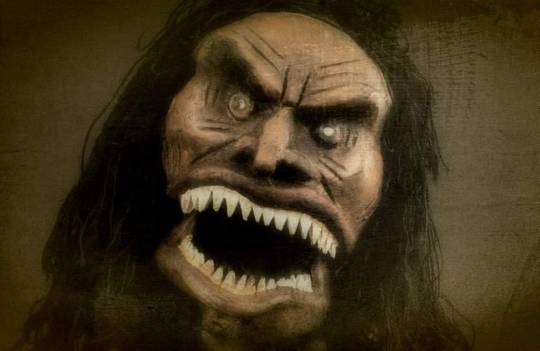
20 notes
·
View notes
Text
youtube
Watch the American Climate Leadership Awards 2024 now: https://youtu.be/bWiW4Rp8vF0?feature=shared
The American Climate Leadership Awards 2024 broadcast recording is now available on ecoAmerica's YouTube channel for viewers to be inspired by active climate leaders. Watch to find out which finalist received the $50,000 grand prize! Hosted by Vanessa Hauc and featuring Bill McKibben and Katharine Hayhoe!
#ACLA24#ACLA24Leaders#youtube#youtube video#climate leaders#climate solutions#climate action#climate and environment#climate#climate change#climate and health#climate blog#climate justice#climate news#weather and climate#environmental news#environment#environmental awareness#environment and health#environmental#environmental issues#environmental justice#environment protection#environmental health#Youtube
11K notes
·
View notes